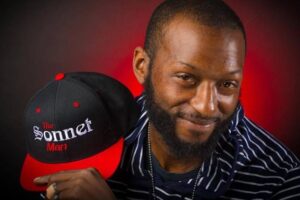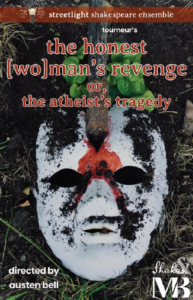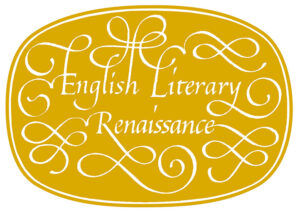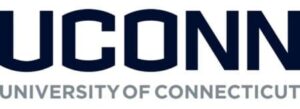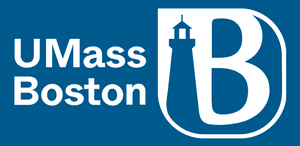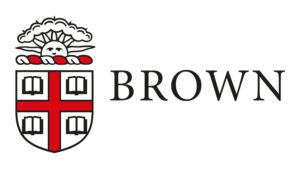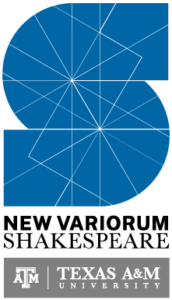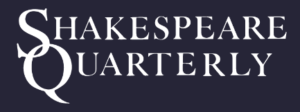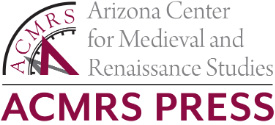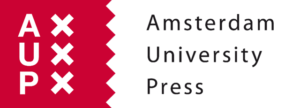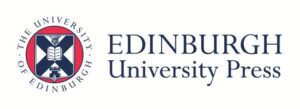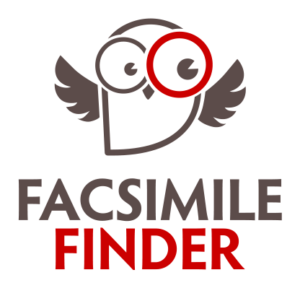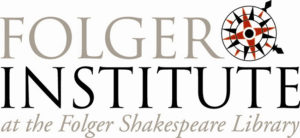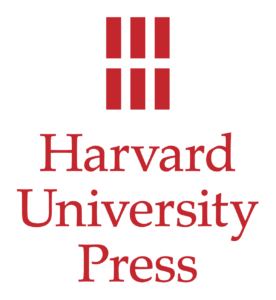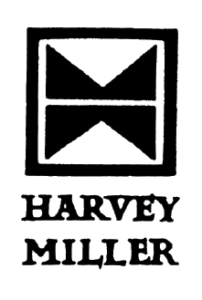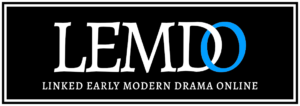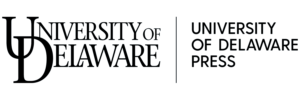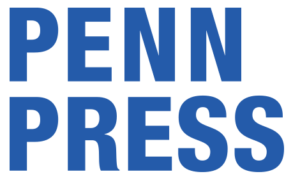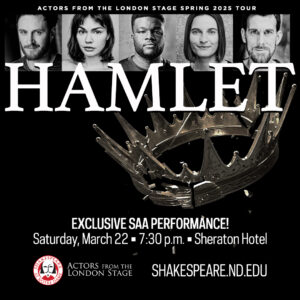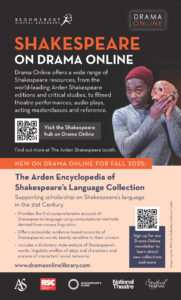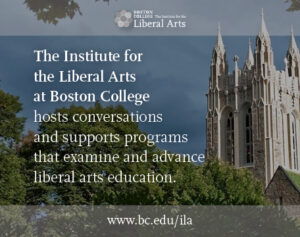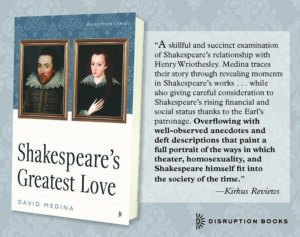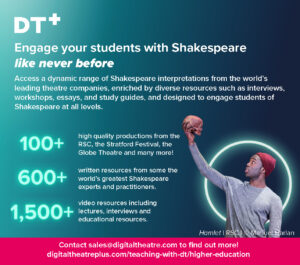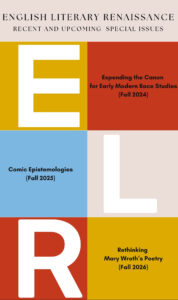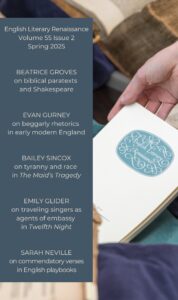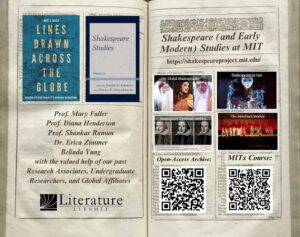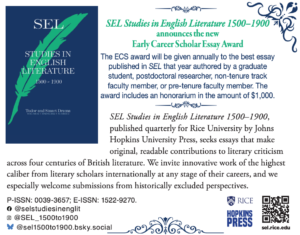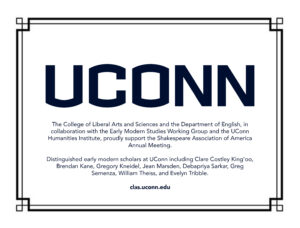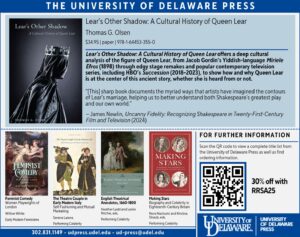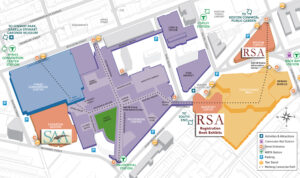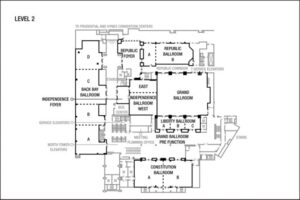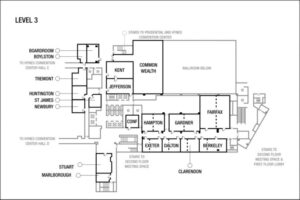2025 Meeting Program and Schedule
19 March ➤
20 March ➤
21 March ➤
22 March ➤
19 March ➤
4:00 to 7:00 p.m.
Registration
Advanced Onsite Registration
📌 Grand-Liberty Foyer, Sheraton 2F
5:00 to 6:00 p.m.
Town Hall Business Meeting
📌 Constitution Ballroom, Sheraton 2F
Open to all registrants.
6:00 to 7:00 p.m.
Cash Bar
📌 Grand-Liberty Foyer, Sheraton 2F
Open to all registrants and their registered guests.
20 March ➤
8:00 a.m. to 6:00 p.m.
Registration
📌 Grand-Liberty Foyer, Sheraton 2F
Book Exhibits
📌 Gloucester Room, Marriott 3F
8:00 to 9:00 a.m.
Professionalization
Meet-and-Greet with Journal Editors
📌 Liberty A, Sheraton 2F
ORGANIZER: Jeremy Lopez, Shakespeare Quarterly
Sponsored by Shakespeare Quarterly
Light refreshments served.
Join the editors of several peer-reviewed journals for coffee and informal conversation about submitting work for publication: what to submit, where to submit, and what to expect after you’ve submitted it. All are welcome, and early-career scholars are particularly encouraged to attend.
8:00 to 9:30 a.m.
Professionalization
Breakfast with the New Variorum Shakespeare
📌 Liberty B, Sheraton 2F
Sponsored by New Variorum Shakespeare
Light refreshments served.
Join the NVS for a drop-in, catered breakfast and a chance to hear about one of the oldest editorial projects in Shakespearean studies, now in a digital format. Free and open to all; no registration required. All are encouraged to attend.
10:00 a.m. to 12:00 noon
Seminar
After King Lear
📌 Tremont, Sheraton 3F
LEADERS: Jessica Rosenberg, Cornell University and Laurie Shannon, Northwestern University
This seminar invites new approaches to King Lear from a range of perspectives: textual, theatrical, philosophical, ecological, political. How might Shakespeare’s markedly ancient play be understood from our own moment of convergent crises and waning institutional authority?
- David J. Baker, University of North Carolina at Chapel Hill
- Miles Drawdy, University of California, Berkeley
- Jennifer Drouin, McGill University
- Doug Eskew, Colorado State University, Pueblo
- Matthew Hunter, Texas Tech University
- Shannon E. Kelley, Fairfield University
- James Kuzner, Brown University
- Rebecca Lemon, University of Southern California
- Maria Sequeira Mendes, Universidade de Lisboa
- Steve Mentz, St. John’s University
- Vin Nardizzi, University of British Columbia
- Kathryn Schwarz, Vanderbilt University
- Danielle A. St. Hilaire, Duquesne University
- Catherine E. Thomas, Georgia Institute of Technology
Seminar
Anne Southwell and Early Modernisms
📌 Dalton, Sheraton 3F
LEADERS: Victoria E. Burke, University of Ottawa, Danielle E. Clarke, University College Dublin, and Christina Luckyi, Dalhousie University
Channeling The Winter’s Tale‘s outspoken Paulina, Anne Southwell engages with religion, politics, and gender as well as natural philosophy and colonialism in her fiercely polemical manuscripts. Furnished with the seminar leaders’ forthcoming edition of Southwell, participants are invited to situate her within both early modern cultures and current criticism and pedagogy. All approaches, including but not limited to ecocritical, theological, historicist, materialist and feminist, are welcome.
- Diana G. Barnes, University of New England
- Wesley Garey, Charleston Southern University
- Jonathan Gibson, Open University, UK
- Cassandra Gorman, Anglia Ruskin University
- Erin A. McCarthy, University of Galway
- Paula McQuade, DePaul University
- Edith L. Snook, University of New Brunswick
- Mihoko Suzuki, University of Miami
- Suzanne Trill, University of Edinburgh
Seminar
Artifacts of Capitalism in Early Modern Drama
📌 Huntington, Sheraton 3F
LEADER: Eric Dunnum, Campbell University
How did early moderns respond to early forms of capitalism and what artifacts did they leave behind that captured their responses? How can these artifacts (sermons, account books, husbandry manuals, etc.) help us understand the way that Shakespeare represents economic activity? Too often we fail to clearly define early or proto or emerging capitalism. This seminar will attempt to find and apply early capitalist artifacts to better understand how Shakespeare is thinking about and representing his own economic system.
- Anthony Brano, Georgian Court University
- Erika Lyn Carbonara, Kalamazoo College
- Elizabeth Hanson, Queen’s University
- Robin Alfriend Kello, Seton Hall University
- Patrick J. Long, University at Buffalo, SUNY
- Scott C. Lucas, The Citadel
- Vincent Mennella, Southern Methodist University
- Mike Opal, Muhlenberg College
- Mickael Boris Popelard, University of Caen Normandy, France
- Rachel Leann Spencer, University of Texas at Austin
- Travis D. Williams, University of Rhode Island
Seminar
As You Like It, As You Like It
📌 Commonwealth, Sheraton 3F
LEADERS: Tom Bishop, University of Auckland and William N. West, Northwestern University
If you like As You Like It, what do you like about it? This seminar invites papers on new ways of thinking about As You Like It. How does this evergreen play in any of its versions explore gender/sexuality; literary genres or performance histories; structures of feeling; kinds of community, environment, humanity, animality, vegetality? We seek many ways of seeing, and we encourage participants to explore both new ways into the play and how it entertains such a variety of ways into the Forest.
- Jonathan Baldo, Eastman School of Music, University of Rochester
- Mathieu D. S. Bouchard, John Abbott College
- Vernon G. Dickson, Florida International University
- Benjamin Jeffery, University of Chicago
- Clare R. Kinney, University of Virginia
- Alexandra Elise LaGrand, Texas A&M University
- Ágnes Matuska, Szegedi Tudományegyetem
- Jeanne H. McCarthy, Georgia Gwinnett College
- Thomas J. Moretti, Iona University
- Katie Elizabeth O’Hare, University of California, Santa Cruz
- Sarah Wall-Randell, Wellesley College
- Robert N. Watson, University of California, Los Angeles
- Breanne Weber, James Madison University
- Michael West, University of Dallas
- Deanne Williams, York University
Workshop
Book Proposal Lab
📌 Jefferson, Sheraton 3F
LEADERS: Karen Raber, University of Mississippi and Rebecca Totaro, Florida Gulf Coast University
In this workshop, participants will become familiar with the required components of a scholarly book proposal, develop a draft of their own proposal, and give and receive feedback on those drafts, specifically with the field of early modern literary and cultural studies in mind. By the end of the workshop, members will have produced a working draft of a scholarly book proposal and a list of presses to which they can send it.
- Katherine Blankenau, University of West Florida
- Mayra Cortes, University of California, Los Angeles
- Deyasini Dasgupta, University of Toronto
- Becky S. Friedman, University of Pennsylvania
- Tianhu Hao, Zhejiang University
- Joanna Huh, University of Cincinnati
- Jennifer Lewin, University of Haifa
- Tyler Sasser, University of Alabama
- Emily Schoenbeck, University of Minnesota
- Anna-Rose Katerina Shack, University of Amsterdam
- Megan Snell, Boston University
- Dorothy Todd, Texas A&M University
Seminar
Displacement in Renaissance Drama
📌 Exeter A, Sheraton 3F
LEADER: Alexander Thom, University of Leeds
Throughout Shakespeare’s drama, as James Joyce once wrote, “the note of banishment, banishment from the heart, banishment from home, sounds uninterruptedly.” Explorations of how Shakespeare handles the theme of displacement are welcome. This seminar will also encourage participants to think comparatively between Shakespeare’s dramatic strategies and those of other Renaissance dramatists.
- Stephen Deng, Michigan State University
- Darlene Farabee, University of South Dakota
- Tonhi Lee, Tufts University
- Sophie Lemercier-Goddard, ENS, Université de Lyon
- Jennifer E. Nicholson, University of Sydney
- Patrick Soto, Yale University
Seminar
Drama and Conversion
📌 Berkeley, Sheraton 3F
LEADER: Stephen Wittek, Carnegie Mellon University
This seminar will consider the relation between early modern drama and the fuzzy, slippery phenomenon of conversion, in all of its many colors and flavors. Projects that consider drama outside of the Shakespearean canon are particularly welcome. Potential areas of focus include political conversions, conversion and race, conversion and colonialism, conversion and performance, spaces of conversion, conversion and nationhood, the texts of conversion, and the dramatic representation of conversional activity.
- Sheila Coursey, Saint Louis University
- John C. Higgins, Case Western Reserve University
- Grace Kimball, University of California, Santa Barbara
- Hannah Korell, University of Wisconsin, Platteville
- Olivia Leonard, Arizona State University
- Philip Lorenz, Cornell University
- Kathleen Lynch, Folger Shakespeare Library
- James D. Mardock, University of Nevada, Reno
- Emily Parise, University of California, Irvine
- Holly C. Pickett, Washington and Lee University
- Maria Teresa Micaela Prendergast, College of Wooster
- Catherine Reedy, Lake Forest College
- Karen Robertson, Vassar College
- Jordan William Zajac, Providence College
Seminar
Early Modern Foodways: New Perspectives
📌 Newbury, Sheraton 3F
LEADERS: David B. Goldstein, York University and
Victoria Yeoman, Seneca Polytechnic
This seminar asks what the study of foodways teaches us about early modernity. Food—as symbol, metaphor, event, object, or relationship—demarcates tensions that lie at the core of Shakespeare’s theatrical and poetic concerns. Papers are invited on any aspect of foodways, including race and cross-cultural encounter, hospitality and otherness, sex and gender, recipes as communicative forms, ecology and animal studies, social and religious politics, and the development of science and medicine.
- Patricia A. Cahill, Emory University
- Sheila T. Cavanagh, Emory University
- Stephen Cohen, Central Connecticut State University
- Bethan Mary Davies, University of Roehampton
- Jennifer Forsyth, Kutztown University
- Anna Rebecca Lewis, University of Toronto
- Ian F. Moulton, Arizona State University
- Kara J. Northway, Kansas State University
- Rachel E. Poulsen, Edgewood College
- Jan K. Purnis, Campion College, University of Regina
- Jennifer C. Vaught, University of Louisiana, Lafayette
- Eunwoo Yoo, University of California, Santa Barbara
Seminar
The Early Modern Undead: Zombies, Monsters, and Shakespeare
📌 Hampton, Sheraton 3F
LEADERS: Ambereen Dadabhoy, Harvey Mudd College and Carol Mejia LaPerle, Wright State University
What is the afterlife of an undead author? How is the Shakespearean corpus a monstrous text? What do monsters reveal about the culture that produces them? How do early modern anxieties about decay, horror, and loss of self-sovereignty anticipate the figure of the zombie? This seminar exhumes the early modern undead to consider how it informs Shakespeare and his contemporaries’ concerns with collapsing civilizations, the biopolitics of survival, and the affects of fear, desperation, and disgust.
- Mira ‘Assaf, Butler University
- Marlin E. Blaine, California State University, Fullerton
- Kate Bolton Bonnici, Pepperdine University
- Hanh Bui, Shakespeare’s Globe
- Ani Govjian, University of Pennsylvania
- Saraya Daisy-May Haddad, Shakespeare Institute, University of Birmingham
- Katherine Hennessey, Wenzhou-Kean University
- Tracey Miller-Tomlinson, New Mexico State University
- Mary Odbert, Fort Collins, Colorado
- Margaret E. Owens, Nipissing University
- Johaeng Rho, Saint Louis University
- Jeffrey Scott Squires, Carnegie Mellon University in Qatar
- Penelope Meyers Usher, Barnard College
Seminar
Ecofeminist Approaches to Shakespeare and His Contemporaries
📌 Fairfax A, Sheraton 3F
LEADERS: Aurélie Griffin, Université de la Sorbonne Nouvelle and Claire Hansen, Australian National University
How might we advance our understanding of the early modern relationship between gender and the natural world? Acknowledging developments in ecofeminist criticism, this seminar invites papers on ecofeminist approaches to Shakespeare and his contemporaries. Drawing on movements across ecocriticism and the environmental humanities, participants are invited to consider the intersections of gender, feminisms and materialism with the environment, place, the more-than-human and ecological systems.
- Mary Adams, Western Carolina University
- Shaul Bassi, Università Ca’ Foscari Venezia
- Catherine Rose Evans, University of Exeter
- E. Rose Grant, University of Toronto
- Nicole A. Jacobs, California Polytechnic State University
- Erin K. Kelly, California State University, Chico
- Kyle Matthew Labe, University of Connecticut
- Gretchen E. Minton, Montana State University
- Q. Ostendorf, Occidental College
- Chloe K. Preedy, University of Exeter
- Peter C. Remien, Lewis-Clark State College
- Kara Ann Rush, University of North Carolina, Chapel Hill
- Gregory M. Schnitzspahn, Fisher College
- Emily L. Sharrett, Loyola University Chicago
- Monika Smialkowska, Northumbria University
- Tiffany J. Werth, University of California, Davis
Seminar
Future Fletchers
📌 Stuart, Sheraton 3F
LEADERS: Clare McManus, Northumbria University, José A. Pérez Díez, University of Leeds, and Michael M. Wagoner, United States Naval Academy
Four hundred years after the death of John Fletcher, how have developments in our field altered our reception and interpretation of the playwright who was in many ways the heir to William Shakespeare? How has the study of Fletcher historically intertwined with or diverged from the study of Shakespeare? Finally and most importantly, how does Fletcher’s global, feminocentric, queer, and trans drama offer an alternative sense of the early modern, and what does that alternative promise for future directions in early modern scholarship, editing, pedagogy and performance practice?
- Reut Barzilai, University of Haifa
- Suzanne Gossett, Loyola University Chicago
- Huw Griffiths, The University of Sydney
- Lucy Alice Holehouse, Royal Holloway University of London
- Jeremy Lopez, Montclair State University
- Lori Humphrey Newcomb, University of Illinois, Urbana-Champaign
- Vimala C. Pasupathi, Hofstra University
- James Purkis, University of Western Ontario
- Joseph F. Stephenson, Abilene Christian University
- Misha Teramura, University of Toronto
- Virginia Mason Vaughan, Clark University
Seminar
The Gender of Paratexts
📌 Kent, Sheraton 3F
LEADERS: Heidi Craig, University of Toronto and Andie Silva, York College, CUNY
How does gender influence the form and content of early modern paratexts? How might their liminal status and framing functions help us complicate and expand notions of gender? We invite papers or DH projects that explore the historical, political, or rhetorical roles of gender for authors, translators, and stationers; as well as the gendering of readers, dedicatees, book buyers, or even books, themselves. Work that subverts gender binaries and gendered reading practices is especially welcome.
- Miranda Alksnis, University of Wisconsin, Madison
- Adele S. Davidson, Kenyon College
- Spencer Grayson, University of Virginia
- Joshua R. Held, Southeastern Oklahoma State University
- Eileen A. Horansky, Ohio State University
- Emily L. Loney, Bucknell University
- Sara D. Luttfring, Pennsylvania State University, Behrend
- Céline Laure Magada, Université de Lausanne
- Shuo Niu, University of York
- Simone Waller, Reed College
Seminar
Global Performance and Adaptations of Richard III
📌 Fairfax B, Sheraton 3F
LEADERS: Juan F. Cerdá, Universidad de Murcia and Jennifer Ruiz-Morgan, University of Murcia
Sponsored by the European Shakespeare Research Association
We invite contributions that chart Richard III‘s non-anglophone reception from the sixteenth century to the present in any media or format: stage, operatic, cinematic/televisual/digital performance, translations, adaptations, appropriations, rewritings. We particularly welcome papers that relocate the play’s ideological and identity boundaries within specific historical and theoretical contexts, while also connecting local interventions to broader regional, national or transnational concerns.
- Jitka Štollová, Helsinki Collegium for Advanced Studies
- Stella Achilleos, University of Cyprus
- Graham K. Gregor, Universidad de Murcia
- Stuart Hampton-Reeves, University of Warwick
- Yu Jin Ko, Wellesley College
- Zoltán Márkus, Vassar College
- Alexander Thomas Mika, Pennsylvania State University
- Jonathan Shelley, St. John Fisher University
Seminar
Mourning, Memorializing, and Grieving in Shakespeare’s World
📌 Gardner A, Sheraton 3F
LEADERS: Lesel Dawson, University of Bristol and Kaara Peterson, Miami University of Ohio
Our seminar asks what constitutes the relationship of the living to the dead. How are mourning, memorializing, and grieving represented in Shakespeare’s works and across early modern culture? Do novel therapeutic and philosophical models of adaptive grieving shed light on early modern bereavement—or discover important disjunctions? Participants may explore grief and memorializing in Shakespearean texts and in dialogue with other literature, art, effigies/material objects, cultural practices, and/or as construed across disciplines.
- Naomi Baker, University of Manchester
- Effie Botonaki, Aristotle University of Thessaloniki, Greece
- Abigail Jean Gomulkiewicz, University of St. Francis
- Sarah Hodgson, Shakespeare Institute
- Liesl Elphie Jensen, Shakespeare Institute, University of Birmingham
- Joseph Hirzer Kidney, Stanford University
- Kelly Lehtonen, Campbellsville University
- Nina Levine, University of South Carolina
- Andrew D. McCarthy, University of Tennessee, Chattanooga
- Anne M. Myers, University of Missouri
- Jayme Peacock, Quincy University
- Susan Rojas, Naples, FL
- Amy J. Scott, Toronto, ON
Seminar
Novelizing Shakespeare
📌 Gardner B, Sheraton 3F
LEADERS: Katharine Cleland, Virginia Tech and Paul J. Zajac, McDaniel College
This seminar invites papers that examine the novelization of Shakespeare‘s work and life to any extent. We will explore how novelists appropriate Shakespeare‘s themes, plots, and characters, while also asking what happens when his plays get adapted specifically as novels. What is the purpose or appeal of novelistic adaptations? How do changes in genre relate to changes in cultural context? How might novelistic adaptations contribute to our reconsideration of Shakespeare’s relevance in 2025?
- Claire M. Busse, La Salle University
- Luis J. Conejero-Magro, Universidad de Extremadura
- Alessandro C. Garganigo, Austin College
- Melissa M. Johnson, Lyon College
- Erin K. Minear, College of William & Mary
- Angeline M. Morris, University of Tennessee Southern
- Anthony G. Patricia, Concord University
- Julie Prior Salman, Dallas College
Open Workshop
Shakespeare in Performance
📌 Republic A, Sheraton 2F
LEADERS: Shakespeare in Performance Actors from The London Stage
The five actors of the AFTLS Spring 2025 Tour of Hamlet lead an interactive workshop demonstrating performance-based teaching techniques for the college classroom. Attendees will discover the power of embodied learning/engagement when approaching Shakespeare’s plays. Open to all conference registrants and registered guests.
Workshop
Testing Throughlines: The Present Moment, Premodern Critical Race Scholarship, and Teaching
📌 Clarendon, Sheraton 3F
LEADERS: Lisa M. Barksdale-Shaw, Arizona State University and Laura Turchi, Arizona State University
This workshop invites faculty to experiment with new Throughlines content and aims to build shared confidence for integrating discussions of race in literature classrooms. Throughlines is an online compendium of premodern critical race scholarship built by RaceB4Race. Designed as a multi-media home for pedagogical and scholarly resources, Throughlines supports teaching the historical arcs of race and race-making in a holistic and intersectional way—pointing students toward more inclusive futures.
- Jennifer Black, Boise State University
- Eric L. De Barros, American University of Sharjah
- Jesus A. Montaño, Baylor University
- Vanessa L. Rapatz, Ball State University
- Mary Trull, St. Olaf College
Seminar
Women Writing Transatlantic Slavery
📌 Exeter B, Sheraton 3F
LEADER: Kimberly Anne Coles, University of Maryland
Scholarship on early modern women’s writing has not always made their complicity in the English colonial project fully visible. This seminar will confront that complicity. We need to recognize women among the chief authors of the rhetoric and cultural codes that rewrote Black people as chattel and consumable goods. Emphasis will be placed on plays and masque performances written by women—or performances where women controlled the representation. Work responding to women writers is also welcome.
- David Sterling Brown, Trinity College
- Hannah N. Chambers, Emory University
- Angelina Del Balzo, Utah Valley University
- Margaux Delaney, Cornell University
- Sarah Gray Lesley, University of Chicago
- Kristina Lucenko, Stony Brook University
- Melissa E. Sanchez, University of Pennsylvania
- Whitney Sperrazza, Texas A&M University
11:00 a.m. to 12:30 p.m.
2026 WSC in Verona — Information Session
📌 Back Bay A&B, Sheraton 2F
PRESENTERS: Silvia Bigliazzi, University of Verona, Peter Holland, University of Notre Dame, Bi-qi Beatrice Lei, National Taiwan University, Emanuel Stelzer, University of Verona, and Cristiano Ragni, University of Verona
Find out about the 2026 World Shakespeare Congress’s academic program, performances, exhibits, and social events, and how to sign up for seminars and workshops.
12:00 noon to 1:00 p.m.
Professionalization
Silencing Scholars: Academic Repression and Palestine
📌 The Fens, Sheraton 5F
ORGANIZER: Katherine Gillen, Professor of English, Texas A&M University-San Antonio
Ambereen Dadabhoy, Harvey Mudd College
Nora Galland, University of Bretagne Occidentale
Margo Hendricks, University of California, Santa Cruz
Anna-Claire Simpson, University of Massachusetts, Amherst
This meeting invites SAA members who are invested in antiracist and anti-imperialist scholarship, teaching, and activism in this challenging political climate, starting with the premise that Anti-Palestinian policies and discourses in academia are intimately connected to the threats to academic freedom we face by those who oppose knowledge production that resists cultural and political hegemonic norms.
1:30 to 3:00 p.m.
Shakespeare Futures Roundtable
Theatrical Labor and the Audience
📌 Back Bay A&B, Sheraton 2F
ORGANIZER: Nora J. Williams, BIMM University
CHAIR: Margaret Jane Kidnie, University of Western Ontario
Nora J. Williams, BIMM University
Ophelia’s Laborious Afterlives
Peter Kirwan, Mary Baldwin University
Playing the Work
Margaret Jane Kidnie, University of Western Ontario
Creative Collaborations
John R. Proctor III, Tulane University
Audiences Reading Race, Gender, and Authority in the Shakespearean Stage Picture
Roundtable
Performance as Research: Scholar/Theatermaker Collaborations at the Red Bull
📌 Back Bay C&D, Sheraton 2F
ORGANIZER and CHAIR: Jean Elizabeth Howard, Columbia University
Jesse Berger, Red Bull Theater
The Scholars’ Role in Creating Effective Performances at Red Bull Theater
Barbara Fuchs, University of California, Los Angeles
Diversifying the Classics and Red Bull
Musa Gurnis, Baruch College/Red Bull Theater
The Early Modern Scene Work Collaborative
Noémie Ndiaye, University of Chicago
Difficult Conversations
Tanya Pollard, Brooklyn College, CUNY
Staging Women
3:30 to 5:30 p.m.
Seminar
Antony and Cleopatra
📌 Jefferson, Sheraton 3F
LEADERS: Heather James, University of Southern California and John M. Kuhn, SUNY Binghamton
We invite papers relating to any aspect of Shakespeare’s Antony and Cleopatra, its sources, its contexts, and its varied afterlives in print and performance. Revisiting the play—which has not been the sole subject of an SAA seminar for decades—seems to us to be particularly timely in our present moment, given its engagement with issues of sex and gender; empire and colonialism; and race and ethnicity. We welcome papers that touch on these or any other topic relating to the play.
- Virginia M. Burnett, Universidad de Puerto Rico
- Laura DeLuca, Carnegie Mellon University
- Jonas Gardsby, University of Wisconsin, Green Bay
- Kelley Katherine Glasgow, Boston College
- Dustin M. Meyer, Francis Marion University
- Daniel D. Moss, Southern Methodist University
- Marissa Nicosia, Pennsylvania State University, Abington College
- Amanda K. Ruud, Valparaiso University
- Katherine I. Shrieves, University of Massachusetts, Lowell
- Claire Sommers, Washington University in St. Louis
- Robert Stagg, Texas A&M University
- M. L. Stapleton, Purdue University, Fort Wayne
- Lauren Weindling, University of Toronto
Seminar
Early Modern Cosmologies, Part One
📌 Commonwealth, Sheraton 3F
LEADERS: Jane Hwang Degenhardt, University of Massachusetts, Amherst and Henry S. Turner, Rutgers University
This seminar reads Renaissance plays and poems for their engagements with early modern cosmology, or accounts of what constitutes a “world” at the turn of the 17th century. Looking past the early modern as the origin point for globalization or a source for humanist worldviews, the seminar invites papers that explore the more radical cosmologies of the 16th and 17th centuries to twist the epistemological and ontological settlements of modernity and seed ideas for our own speculative world-making.
- John M. Archer, New York University
- Amanda B. Atkinson, Texas Christian University
- Kristen Abbott Bennett, Framingham State University
- Piers Brown, Kenyon College
- Mackenzie Anne Cooley, Hamilton College
- Kathryn A. Crim, University of Chicago Society of Fellows
- Andrew Griffin, University of California, Santa Barbara
- Jennifer Elise Grober, King’s College London
- Radhika Koul, Claremont McKenna College
- Lynn M. Maxwell, Spelman College
- Sim Ong, University of Toronto
- Goutam Piduri, Brown University
- Mel Vipperman-Cohen, California State University, Fullerton
Seminar
Early Modern Horror
📌 Gardner B, Sheraton 3F
LEADER: Claire M. Falck, Rowan University
This seminar invites papers that explore horror as an early modern literary genre. Topics may include how to define early modern horror; horror as a hybrid generic mode; how horror interacts with different literary forms; and readings of early modern horror texts from a range of critical perspectives.
- Kim Howard Carrell, Worcester State University, Massachusetts
- Matthew Bryan Gillis, University of Tennessee, Knoxville
- David J. Gram, Oakland University
- Ethan J. Guagliardo, University of British Columbia
- Caitlin Mahaffy, Mount Holyoke College
- Barbara Mello, California State University, Long Beach
- Curtis Perry, University of Illinois, Urbana-Champaign
- Caro Pirri, University of Pittsburgh
- Constance C. Relihan, Virginia Commonwealth University
- Matthew Ritger, Dartmouth College
- Alison Victoria Scarlett, University of South Florida
- Khristian S. Smith, University of North Carolina, Chapel Hill
Seminar
Early Modern Underworlds
📌 Exeter B, Sheraton 3F
LEADER: Joel E. Slotkin, Towson University
What does it mean to posit a world beneath this one, and what calls us down into it when we are supposed to look up to higher things? We will investigate various underworlds in the early modern imagination, including subterranean afterlives as well as criminal underworlds. Early modern writers also sometimes called our own world an underworld. What cultural work do these underworlds perform? How might one type relate to another? Why are these spaces so fascinating?
- Catherine G. Canino, University of South Carolina, Upstate
- Nicholas Jones, Oberlin College
- Josiah Lamb, University of Toronto
- Amani Liggett, University of California, Santa Cruz
- Alan H. Nelson, University of California, Berkeley
- Scott Oldenburg, Tulane University
- Charlotte Thurston, Graduate Center, CUNY
Open Workshop
From Bard to Beat: Teaching Shakespeare Through Hip-Hop and Poetry
📌 Republic A, Sheraton 2F
LEADERS: Devon Glover, The Sonnet Man and Katherine Steele Brokaw, University of California, Merced
Join Devon Glover the Sonnet Man, a rapper/poet, teacher, playwright, director and actor, to explore new avenues into Shakespeare. Come see how hip hop and creative writing can unlock your students’ interest and understanding of The Bard.
Workshop
Going Beyond Reading Aloud: Performance Pedagogy in the Classroom
📌 Fairfax A, Sheraton 3F
LEADER: Jennifer Birkett, University of Notre Dame
Shakespeare’s plays were written for players on the stage, and yet most students only ever grapple with them cerebrally on the page. Looking beyond merely assigning students to read aloud, or memorize monologues, this pedagogy workshop seeks to present and distribute pedagogical techniques and materials for teaching early modern literature (not just Shakespeare’s plays) through performance. Specifically, we will focus on lesson plans, in-class activities, assignments, discussion questions, midterm exams, and group work. The workshop intends to bring junior scholars, contingent faculty, non-tenure track faculty, and faculty at teaching-focused institutions together to share experiences and resources. Be prepared to get out of your chairs and up on your feet!
- Valerie Billing, Central College
- Hannah Bredar, Anne Arundel Community College
- Joseph P. Haughey, Northwest Missouri State University
- Kimberly A. Huth, California State University, Dominguez Hills
- Janelle Auriol Jenstad, University of Victoria
- Melissa J. Jones, Eastern Michigan University
- Owen Kane, Brock University
- Travis Knapp, Valley City State University
- Nathaniel C. Leonard, Westminster College, Missouri
- Cameron H. McNabb, Eckerd College
- James A. Rizzi, Canisius University
- Megan Lynn Selinger, University of Waterloo
- Emily Yates, Clemson University
Seminar
Habit—Inhabit—Habitation—Habitat
📌 Huntington, Sheraton 3F
LEADER: Joseph Campana, Rice University
An ecology of cognates derived from habeo: to have, hold, keep, possess, cherish, occupy, enclose, contain, inhere, dwell. Take any of these four terms individually or create networks. What logics and erotics govern indwelling dispositions? How to understand dwelling and dwellings, human or not? Does “habit” inform “inhabit”? Does the early modernity of habit and inhabit prepare for later terms—habitat or environment? Augustine’s consuetudo? Nests or houses? Bourdieu’s habitus? Other cognates?
- Lukas Arnold, Universität Zürich
- Lowell Duckert, University of Delaware
- Holly E. Dugan, George Washington University
- Christine Hoffmann, West Virginia University
- Gavin Hollis, Hunter College, CUNY
- Katherine Hunt, University of East Anglia
- Jennifer A. Low, Florida Atlantic University
- Lucy Munro, King’s College London
- Bernadette Myers, Washington University in St. Louis
- Carolyn Sale, University of Alberta
- Richard Allen Strier, University of Chicago
- Jeff Theis, Salem State University
- David Vaughan, Northwestern Oklahoma State University
- Daniel J. Vitkus, University of California, San Diego
- Julian Yates, University of Delaware
Seminar
How Not to Be a Misogynist
📌 Kent, Sheraton 3F
LEADER: Lilly Berberyan, Northwestern State University of Louisiana
How might scholars of the early modern period inadvertently engage in “reading as a misogynist” by reinscribing narratives of oppression, patriarchy, and of course, misogyny? How do such narratives create a false sense of historical transformation that comforts us about the present, while undermining our ability to read beyond or against the “discovery” of men’s anxiety and women’s disempowerment? What social and political ends are served by this subtle misogyny and how can less biased reading advance different interests and agendas?
- Stephanie Chamberlain, Southeast Missouri State University
- Benjamin Hilb, Francis Marion University
- Robert Hornback, Oglethorpe University
- Laura E. Kolb, Baruch College, CUNY
- Jess McCall, Delaware Valley University
- Esther B. Schupak, Bar-Ilan University
- Alexandra Kathryn Sengupta, George Washington University
- Natasha Sofranac, Belgrade University
- Mary K. Steible, Southern Illinois University Edwardsville
- Alicia Tomasian, William Rainey Harper College
Seminar
Magic, Science, Knowledge, and Popular Belief, Part One
📌 Dalton, Sheraton 3F
LEADER: Rebecca Bushnell, University of Pennsylvania
In early modern Europe new philosophical trends and novel technologies increasingly influenced people’s understanding and uses of the natural world. However, magic still flourished, undergirded by everyday beliefs about that world. This seminar invites papers that address magical beliefs and practices (elite and common), technology, and new modes of inquiry, with their implications for understanding the natural world we inhabit.
- Pavneet S. Aulakh, Vanderbilt University
- Caitlin Burge, University of Galway
- Kenneth Crowther, University of Southern Queensland
- Kaitlyn Culliton, Texas A&M International University
- Ciara J. Fulton, University at Buffalo, SUNY
- Ali Madani, Stanford University
- John M. Mucciolo, Sayville, NY
- John L. Parker, University of Virginia
- Marie H. Roche, University of Massachusetts, Amherst
- Amos Rothschild, St. Thomas Aquinas College
- Mackenzie Margaret Tomlinson, Oklahoma State University
- Wendy Wall, Northwestern University
- Matthew Walsh, University of Massachusetts, Amherst
- Natalia S. Zelezinskaya, Belarusian State University
Seminar
Matter in Time: New Theater Histories
📌 Hampton, Sheraton 3F
LEADERS: Nicole Sheriko, Yale University and Emma M. Solberg, Bowdoin College
Theaters are full of things: ruffs, rats, swords, snacks, papers, players, weather, wood. Performance culture is sustained by the inter-theatrical recycling of objects, bodies, and spaces. This seminar invites critical approaches to the temporality of theatricality materiality, considering forms of reuse and repurposing, of remembering and forgetting, of rebirth and haunting in order to open up new directions for studying theater’s material history across the medieval/early modern divide and beyond.
- Gina M. Di Salvo, University of Tennessee, Knoxville
- Pierre Hecker, Carleton College
- Isabel C. Karremann, Universität Zürich
- Natasha Korda, Wesleyan University
- David Landreth, University of California, Berkeley
- Anouska Lester, University of York
- Danielle Rosvally, University at Buffalo, SUNY
- William G. Roudabush, Southern Methodist University
- Elizabeth E. Tavares, University of Alabama
- Julie Thompson, Burman University
- Christina Wald, Universität Konstanz
- Denise A. Walen, Vassar College
- Hannah Louise Wilson, King’s College London
Seminar
Mind(ing) the Stage
📌 Stuart, Sheraton 3F
LEADERS: Heather A. Hirschfeld, University of Tennessee and Nathalie E. Rivere De Carles, Université de Toulouse Jean Jaures
This seminar considers how the Shakespearean stage (re)presented the nature of the mind, its cognitive/emotional capacities, and its relation to the body and world. We invite essays on early modern theatrical “minding” from multiple perspectives, including the staged mind in its spatial environments; the mind as a locus of intention and personhood; the centrality of mind games to plot and character; the use of dramatic conventions to affect the cognitive experiences of actors and audience.
- James E. Berg, Middlebury College
- Caroline Bicks, University of Maine
- Silvia Bigliazzi, University of Verona
- Christopher Crosbie, North Carolina State University
- Pascale Caroline Drouet, Université de Poitiers
- Claire Guéron, Université de Bourgogne
- Laura Hatch, Brigham Young University
- Jim Kearney, University of California, Santa Barbara
- Allison Lemley, Johann Wolfgang Goethe-Universität Frankfurt am Main
- Anne Sophie Refskou, Aarhus University, Denmark
- Emily Shortslef, University of Kentucky
- Amina Tajbhai, Hostos Community College, CUNY
- Suzanne Tanner, Avila University
- Evelyn Tribble, University of Connecticut
Seminar
Performing Bodies in Early Modern Drama, Part One
📌 Tremont, Sheraton 3F
LEADER: Eleanor K. Rycroft, Bristol University
Bodies multiply in early modern drama. This seminar will examine the staging of bodies in historical and contemporary performance, questioning the singularity of “the body” on a stage which bodied forth, and resisted, dominant ideas and assumptions. Participants may wish to consider bodies in plural or in part/s; bodies stilled or in motion; racialized/classed/disabled/gendered/animal bodies; the material cultures of bodies; and bodies at different points of the lifecycle, including corpses.
- Sally Barnden, Swansea University
- Thomas Betteridge, Brunel University London
- Catherine R. Clifford, Hastings College
- Elizabeth Dieterich, Carnegie Mellon University
- Kim Gauthier, Université du Québec à Montréal
- Jifeng Huang, Universität Zürich
- Willnide Lindor, SUNY Cortland
- Karen S. Marsalek, St. Olaf College
- Lynsey McCulloch, Royal Shakespeare Company
- Laurence J. Publicover, University of Bristol
- Ellen Schaffert, University of Nottingham
- Rachel J. Willie, Liverpool John Moores University
- Susanne L. Wofford, New York University
- Gillian Woods, Oxford University
Seminar
Re-weirding and/as Re-wilding in Shakespeare
📌 Newbury, Sheraton 3F
LEADERS: Darryl Chalk, University of Southern Queensland and Laurie Johnson, University of Southern Queensland
How do early modern plays invoke weirdness in the encounter with the wilderness? Do weird phenomena speak to an uncanny overlap between the natural, supernatural, and preternatural dimensions of life and world? We ask if some modes of literary ecology have made us too familiar with the natural world in the plays, losing sight of the strangeness of this world and the stage’s engagement with it. Can “re-weirding” in criticism or performance thus be used to recapture early modern senses of the demonic, fated, magical, spiritual, and just plain “wild” forces beyond human control?
- Sophie Chiari, Université Clermont Auvergne
- Douglas Clark, University of Oxford
- Sarah Crover, Vancouver Island University
- Nathan Dooner, De Montfort University
- Gillian Murray Kendall, Smith College
- David McInnis, University of Melbourne
- Victoria Louise McMahon, Independent Scholar
- Kristen E. Poole, University of Delaware
- Nikki Roulo, University of Michigan
- Kelly J. Stage, University of Nebraska, Lincoln
- David A. Summers, Capital University
- Barbara Taylor, Australian National University
- Anne-Maree Ruth Wicks, University of Southern Queensland
Workshop
Shakespeare and Blended Learning
📌 Clarendon, Sheraton 3F
LEADER: Jay Zysk, University of Massachusetts, Dartmouth
Blended pedagogy thoughtfully combines in-person and online learning modalities. What happens when blended learning meets the Bard? This workshop explores practical strategies for teaching Shakespeare that fully integrate in-person classroom activities with digital resources and tools used synchronously and asynchronously online. We will consider how blended Shakespeare pedagogy can stimulate student engagement through active learning and create a more inclusive and accessible classroom for all.
- Sean M. Benson, University of Mary Hardin-Baylor
- Clara K. Biesel, Southern Connecticut State University
- Margaret Christian, Pennsylvania State University, Lehigh Valley
- Maria Doyle, University of West Georgia
- J. Caitlin Finlayson, University of Michigan, Dearborn
- Rebecca Olson, Oregon State University
- Lisa S. Starks, University of South Florida
- Belinda Yung, Massachusetts Institute of Technology
📁 View Abstracts
Seminar
Shared Forms
📌 Berkeley, Sheraton 3F
LEADERS: Adhaar Noor Desai, Bard College and
Dianne Mitchell, University of Colorado, Boulder
How might critical and pedagogical methods respond to form’s sharedness across time and space? How do memes, meter or tune repurposing, or the authorial identity “anon” rupture monovocality? How might the flexibility of form afford us more flexible conceptions of authorship, periodization, or literariness? Papers might study specific instances of a borrowed literary device, imitation, parody, or repurposing, or they might broadly theorize early modern views of genre, convention, or commonality.
- Charlotte Artese, Agnes Scott College
- Jessica Beckman, Dartmouth College
- Gabriel Bloomfield, United States Naval Academy
- Sierra Kay Carter, University of York
- Christine Coch, College of the Holy Cross
- Nicholas Devlin, The Gallatin School, NYU
- Matthew P. Harrison, West Texas A&M University
- Eve Houghton, University of Cambridge
- Yunah Kae, College of Charleston
- Jonathan P. Lamb, University of Kansas
- David Nee, Louisiana State University
- Mary H. Truglia, Indiana University
- Benjamin VanWagoner, New York, NY
- Maggie Vinter, Case Western Reserve University
- Georgina Eleanor Mary Wilson, University of York
Seminar
A Troilus for Our Time
📌 Gardner A, Sheraton 3F
LEADERS: Jyotsna G. Singh, Michigan State University and Michael Ullyot, University of Calgary
How do recent performances and scholarship contend with Troilus and Cressida as a play for our times? Do its morally flawed characters, its politics, its warfare and myth-making, its appetites, and its rhetoric deserve revaluation through a presentist lens? And why has it remained on the margins of the Shakespeare canon? Participants are invited to interpret the play as a complex, anti-heroic text whose language can be strained and opaque.
- Douglas H. Arrell, University of Winnipeg
- Sibylle Baumbach, University of Stuttgart
- Natalya Din-Kariuki, University of Warwick
- Edward Gieskes, University of South Carolina
- Katherine I. Knowles, The University of Kansas
- Cristiano Ragni, University of Verona
- William R. Rampone Jr., South Carolina State University
Seminar
Who Cares? Care, Caring and Disability in Shakespeare
📌 Fairfax B, Sheraton 3F
LEADER: Susan L. Anderson, Staunton, VA
This seminar invites participants to examine care from a disability studies perspective, asking who cares for whom, in what ways, and with what implications for social justice, identity, and power. How is care inflected by intersections with age, gender, race and class? How does care or its lack show up in performance, text and criticism? Where does it (dis)appear within Shakespeare studies itself? And how do burdens of care sit unevenly within the community of scholars who study this field?
- Rebecca Ann Bach, University of Alabama, Birmingham
- Sarah A. Bischoff, University of California, Los Angeles
- Ann-Sophie Bosshard, Universität Zürich
- Rachel Ellen Clark, Wartburg College
- Delanie R. Harrington Dummit, University of California, Davis
- Lenora Bellee Jones-Pierce, Centenary College of Louisiana
- Joseph Maddocks, Sheffield Hallam University
- Carla Mazzio, University of California, Riverside
- Lindsey Row-Heyveld, Luther College
- Marion Wynne-Davies, University of Surrey
5:30 to 6:30 p.m.

Graduate Student Coffee Hour
📌 Liberty B, Sheraton 3F
8:00 to 10:00 p.m.
Annual Reception
📌 Grand Ballroom, Sheraton 2F
Hors d-oeuvres and cash bar.
Open to all registrants for the Fifty-Third Annual Meeting and their guests. Each guest must have an SAA name tag in order to attend; guest tags may be requested and purchased on the conference registration form.orld
21 March ➤
7:30 to 8:30 a.m.
Yoga
Shakespeare Yoga
📌 Boston Common, Sheraton 5F
Scott Jackson, RYT-200, University of Notre Dame
Open to all registrants for the Fifty-Third Annual Meeting and registered guests.
8:00 to 9:00 a.m.
Breakfast
Graduate Student Breakfast
📌 Liberty A-C, Sheraton 2F
Hosted by the Trustees of the Association.
*Please note that this event is exclusively for SAA graduate students.
8:00 a.m. to 6:00 p.m.
Registration
📌 Grand-Liberty Foyer, Sheraton 2F
Book Exhibits
📌 Gloucester Room, Marriott 3F
9:00 to 10:30 a.m.
Panel
Joseph Papp’s Legacy and the Question of American Shakespeare
📌 Back Bay A&B, Sheraton 2F
ORGANIZER and CHAIR: Louise Geddes, Adelphi University
Louise Geddes, Adelphi University
Inventing American Shakespeare
Paul D. Menzer, Mary Baldwin University
Public Exposure
De’Aris Rhymes, Arizona State University
Joe Papp’s Untraditional Casting in s Post-2020 America
Roundtable
Reimagining Law and Literature: Critical Approaches to Shakespeare Today
📌 Constitution Ballroom, Sheraton 2F
ORGANIZERS: Stephanie Elsky, Rhodes College and Penelope H. Geng, Macalester College
CHAIR: Penelope H. Geng, Macalester College
Todd A. Borlik, Purdue University
Shakespeare, Lyly, and Environmental Law: Greening the Archive
Andrew Bozio, Skidmore College
Dramatic Precedents: Racial Slavery and the Early Modern English Stage
Urvashi Chakravarty, University of Toronto
Law, Labour, and White Property in Shakespeare
Stephanie Elsky, Rhodes College
On Not Being Land: Law and Personhood in Early Modern Women’s Writing
Colby Gordon, Bryn Mawr College
Tarry, Jew: Shylock’s Razor Trans Temporality of Criminal Wounding
José Juan Villagrana, Santa Clara University
Reconsidering White Racial Innocence: Spanish Colonial Legal Discourse and Shakespeare
Panel
Shakespearean Infinities
📌 Back Bay C&D, Sheraton 2F
ORGANIZER and CHAIR: Benjamin Parris, Rice University
Julia Reinhard Lupton, University of California, Irvine
O Infinite Virtue: Cleopatra as Wisdom Queen
Jenny C. Mann, New York University
Amazement in The Tempest
Benjamin Parris, Rice University
Cosmic Infinity and Natural Goodness in The Winter’s Tale
10:00 a.m. to 12:00 noon
Digital Meet-Up
📌 Grand-Liberty Foyer, Sheraton 2F
SAA members who are not formally exhibiting are welcome to share or develop digital projects at this meet-up station. This space offers an opportunity for participants to promote their projects and exchange ideas with others.
Digital Exhibit
Alice Thornton’s Books: Remembrances of a Woman’s Life in the Seventeenth Century
📌 Grand-Liberty Foyer, Sheraton 2F
EXHIBITORS: Cordelia Beattie, University of Edinburgh and Suzanne Trill, University of Edinburgh
The Alice Thornton’s Books project has created a searchable digital edition of her four autobiographical volumes, written c.1659-96. The modernised and semi-diplomatic versions can be read separately or side-by-side. Textual markup enables users to trace people, places and events across the edition and different versions of the same event can be compared on screen.
Digital Exhibit
Macbeth VR Experience
📌 Grand-Liberty Foyer, Sheraton 2F
EXHIBITOR: Peter Kuling, University of Guelph
Macbeth VR Experience is a 25-minute adaptation directed by Peter Kuling featuring voice work by actors from the Stratford Festival of Canada. Developed in partnership with Simwave VR, solo players take part by becoming one of the three witches and participating in the spectacular magic of Shakespeare’s Macbeth through virtual reality.
Digital Exhibit
The Pulter Project: Poet in the Making
📌 Grand-Liberty Foyer, Sheraton 2F
EXHIBITORS: Leah Knight Brock University and Wendy Wall Northwestern University
This prize-winning, international collaboration presents the striking political, scientific, and religious verse of Hester Pulter as mobile, variant artifacts. By endorsing equally-authorized versions of an emerging 17th-century female writer, The Pulter Project models a radical editorial practice and new mode of humanist, collective feminist research in the digital age.
Digital Exhibit
Shakespeare in Brazil
📌 Grand-Liberty Foyer, Sheraton 2F
EXHIBITORS: Cristiane Busato Smith, Arizona State University, Belinda Yung, Massachusetts Institute of Technology, and Mary Erica Zimmer, Massachusetts Institute of Technology
Shakespeare in Brazil provides online access to Brazilian performances of Shakespeare, as well as interviews, essays, and metadata by Brazilian scholars and educators. These resources allow users to view and study productions and interviews with Brazilian playwrights, actors, translators, and theater practitioners. We invite further collaborations.
Digital Exhibit
Sonance: A Journal of Early Modern Sound Studies
📌 Grand-Liberty Foyer, Sheraton 2F
EXHIBITOR: Rachel J. Willie, Liverpool John Moores University
Sonance: A Journal of Early Modern Sound Studies is a new online peer-reviewed interdisciplinary, multidisciplinary and multimedial Open Access journal published by ACMRS Press that addresses historic sound in all its capacious forms from the period c.1400-c.1800. Our focus is global, ranging across all subjects, theories, and methodologies that attend to sound.
Digital Exhibit
Weather Extremes in England’s Little Ice Age 1500-1700
📌 Grand-Liberty Foyer, Sheraton 2F
EXHIBITOR: Madeline Bassnett, Western University
This SSHRC-funded ArcGIS database maps English Little Ice Age weather using narrative data from historical chronicles, diaries, and weather pamphlets. It reveals not only severe cold, but also unusual conditions of heat, drought, and damp. Showing us how climate change destabilized historical weather, the site also allows us to connect the past with today’s experience.
10:30 to 11:00 a.m.
Coffee Break
📌 Grand-Liberty Foyer, Sheraton 2F
11:00 a.m. to 12:30 p.m.
Professionalization
Meet the Arden Shakespeare Publishers with RaceB4Race
📌 Boardroom, Sheraton 3F
For scholars working on Premodern Critical Race Studies who would like an informal meeting slot to discuss publishing their research with one of the commissioning editors at The Arden Shakespeare. This can be about a current or future project or just our book publication process more generally.
11:00 a.m. to 1:00 p.m.
Seminar
Abridging Shakespeare for the British and American Stage
📌 Exeter, Sheraton 3F
LEADERS: Ronan James Hatfull, NYU London / University of Warwick, Rebecca Marie MacMillan, Stroud, UK, and Tom Wilkinson, Oxford, UK
This seminar invites scholarly papers and creative pieces which respond how Shakespeare’s plays have been abridged for the British and American stage, in forms such as clown, drolls, improvisation, parody, and pop music. We seek critical and creative responses which will encompass historical, ethical and political aspects, and address questions regarding the formal properties and theoretical implications of compressed texts to present a rewarding retheorisation of Shakespeare in adaptation.
- Gemma Kate Allred, Université de Neuchâtel
- Stephen M Buhler, University of Nebraska, Lincoln
- Douglas M Lanier, University of New Hampshire
- Austin Tichenor, Chicago, IL
- Stephen M Wisker, Wesleyan College
Seminar
Early Modern Cosmologies, Part Two
📌 Commonwealth, Sheraton 3F
LEADERS: Jane Hwang Degenhardt, University of Massachusetts, Amherst and Henry S. Turner, Rutgers University
This seminar reads Renaissance plays and poems for their engagements with early modern cosmology, or accounts of what constitutes a “world” at the turn of the 17th century. Looking past the early modern as the origin point for globalization or a source for humanist worldviews, the seminar invites papers that explore the more radical cosmologies of the 16th and 17th centuries to twist the epistemological and ontological settlements of modernity and seed ideas for our own speculative world-making.
- Vladimir Brljak, Durham University
- Katherine Eggert, University of Colorado, Boulder
- Jean E. Feerick, John Carroll University
- Emily Glider, Boston University
- Miriam E. Jacobson, University of Georgia
- James A. Knapp, Loyola University Chicago
- Victor Lenthe, Bilkent University
- Caroline Lion, The New Swan Theater, University of California, Irvine
- Courtney Naum Scuro, Columbus, OH
- Don Rodrigues, Old Dominion University
- Adam Rzepka, Montclair State University
- Anita G. Sherman, American University
- Jennifer Waldron, University of Pittsburgh
Seminar
Magic, Science, Knowledge, and Popular Belief, Part Two
📌 Fairfax A, Sheraton 3F
LEADER: Rebecca Bushnell, University of Pennsylvania
In early modern Europe new philosophical trends and novel technologies increasingly influenced people’s understanding and uses of the natural world. However, magic still flourished, undergirded by everyday beliefs about that world. This seminar invites papers that address magical beliefs and practices (elite and common), technology, and new modes of inquiry, with their implications for understanding the natural world we inhabit.
- Vanessa Rodrigues Barcelos, University of Miami
- Roya Biggie, Knox College
- Rinku Chatterjee, Independent Scholar, Woodinville, WA
- Dori Coblentz, Georgia Institute of Technology
- Meg Duell, University of Lausanne, Lausanne, Switzerland
- Susan M. Dunn-Hensley, Wheaton College
- Mary Floyd-Wilson, University of North Carolina, Chapel Hill
- Miranda Hannasch, University of Nevada – Las Vegas
- Judy Margaret Hefferan, University of Southern Queensland
- Wendy Beth Hyman, Oberlin College
- Jesse M. Lander, University of Notre Dame
- Kara McCabe, Boston College
📁 View Abstracts
Seminar
New Paradigms of Embodiment
📌 Newbury, Sheraton 3F
LEADER: Beatrice Bradley, University of Minnesota, Twin Cities
This seminar invites papers that generate new lenses for thinking about the body in early modern studies. Participants might examine anew how contemporary theory can be brought into conversation with premodern texts, and/or they might draw on histories of medicine and the body that have escaped notice from existing humoral-materialist scholarship. Rather than arrive at a definitive paradigm, the seminar will develop a multiplicity of models that reflect the variety of ways in which bodies are conceptualized, defined, and experienced.
- Christopher William Bolster, University of Connecticut
- Emma R. Cohen, Northwestern University
- Kaitlyn J. Engel, SUNY University at Buffalo
- Cora Virginia Fox, Arizona State University
- Timothy Holden, University of Zürich
- Mark Beatrice Kaethler, Medicine Hat College
- Sarah S. Kunjummen, University of Chicago
- Alex Lewis, Folger Shakespeare Library
- James Yukiko Mulder, Bentley University
- Shaun Nowicki, University of California, Santa Barbara
- Katey E. Roden, Gonzaga University
- Jennifer R. Rust, Saint Louis University
- Kathryn Schubert, University of California, Irvine
- Melanie Simoes Santos, University of New Brunswick
- Ashley Thomas, Columbia University
- Naya Tsentourou, University of Exeter
Seminar
Performing Bodies in Early Modern Drama, Part Two
📌 Gardner A, Sheraton 3F
LEADER: Eleanor K. Rycroft, Bristol University
Bodies multiply in early modern drama. This seminar will examine the staging of bodies in historical and contemporary performance, questioning the singularity of “the body” on a stage which bodied forth, and resisted, dominant ideas and assumptions. Participants may wish to consider bodies in plural or in part/s; bodies stilled or in motion; racialized/classed/disabled/gendered/animal bodies; the material cultures of bodies; and bodies at different points of the lifecycle, including corpses.
- Roberta Barker, Dalhousie University
- Taylor Hare, Baylor University
- Hannah Elizabeth Hicks, University of Notre Dame
- Erin E. Kelly, University of Victoria
- Chelsea Lee, University of California, Irvine
- Oliver Lewis, Independent Scholar, University of Roehampton
- Subha Mukherji, University of Cambridge
- Nova Myhill, New College of Florida
- Sarah Neville, Ohio State University
- Chelsea Phillips, Villanova University
- Gina Walter, University of Bristol
Seminar
PlayTime: Theatre History and the Question of Staging Time
📌 Gardner B, Sheraton 3F
LEADERS: Liam Thomas Daley, University of Maryland, College Park and Melanie Rio, Philadelphia, PA
What challenges or opportunities lie in representing time onstage? How did pre-modern playwrights explore questions of temporality? Building on theatre history approaches, this seminar examines time in early modern performance. How were theatrical elements (such as space, props, or costumes) used to convey the passage of time or a sense of historical setting? How might conversations between critical theories of time and theatre history offer new insights? And how does our chronological distance from the archive shape our research?
- Bridget B. Anderson, University of Wisconsin, Madison
- Meredith Beales, University of British Columbia
- Samuel Kolodezh, University of California, San Diego
- Sean K. Lawrence, University of British Columbia, Okanagan
- Richard Preiss, University of Utah
- Gerit Quealy, New York, NY
- John-Paul Spiro, Villanova University
- Kay Stanton, California State University, Fullerton
Seminar
Race and Place in Shakespeare and Spenser
📌 Tremont, Sheraton 3F
LEADERS: Dennis A. Britton, University of British Columbia and Hillary Eklund, Grinnell College
How might placing Spenser and Shakespeare in conversation extend ongoing conversations in premodern critical race studies, ecocriticism, and social justice? This seminar invites papers that examine how Spenser and/or Shakespeare figure racial and natural hierarchies, and how they use place to sort people based on superficial markings and other real or imagined characteristics. Can putting these poets in dialogue create new avenues for situated knowledge, mutual care, and ethical habitation?
- Katharine Addis, Sussex University
- Erika M. Boeckeler, Northeastern University
- Douglas Farquhar Cavers, University of Southern California
- Zainab Cheema, Florida Gulf Coast University
- Eli Cumings, Columbia University
- Claire J. Eager, The College of Wooster
- Jareema Hylton, Emory University
- M. Lindsay Kaplan, Georgetown University
- Debapriya Sarkar, University of Connecticut
- Ashley Sarpong, California State University, Stanislaus
- Kirsten Schuhmacher, University of California, Davis
- Justin P. Shaw, Clark University
- Valerie Voight, University of Tennessee
- Patricia Wareh, Union College
Seminar
Reimagining the Female Life Cycle in Shakespeare’s Time
📌 Dalton, Sheraton 3F
LEADERS: Anna Graham, University College Dublin and Edel Lamb, Queen’s University Belfast
This seminar explores portrayals of the female life cycle in early modern literature to consider how, when and to what effect women’s roles were defined by age rather than marital status. It invites papers on the importance of women’s life stages, women’s appropriation of models of ageing, sources for re-evaluating life cycles, and how methodologies of transgender studies, critical race theory and disability studies amplify or complicate understandings of gendered ageing in Shakespeare’s time.
- Katarzyna Burzyńska, Adam Mickiewicz University
- Danielle Drees, Harvard University
- Marion Doreen Hollings, Middle Tennessee State University
- Katharine E. Landers, Illinois State University
- Naomi C. Liebler, Montclair State University
- Lynne Magnusson, University of Toronto
- Hillary M. Nunn, University of Akron
- Camila Reyes, University of Southern California
- Edel Semple, University College Cork
Seminar
Rethinking Fidelity in Adaptations of Shakespeare, Part One
📌 Hampton, Sheraton 3F
LEADER: James T. Newlin, Case Western Reserve University
This seminar invites papers that rethink what it means to be faithful to Shakespeare. How might even a “slant” or “wild” adaptation of Shakespeare recall the text, performance history, or historical context of Shakespeare’s original? Papers that consider Shakespeare’s engagement with his own sources, as well as the reception and staging of Shakespeare’s works, are both welcome. Approaches might include either individual case studies or broader theorizations of fidelity and difference.
- Dane Anderson, University of Michigan
- Benjamin Broadribb, Independent Scholar, London, England
- Melissa Croteau, California Baptist University
- Emma Elizabeth de Beus, Queen’s University Belfast
- Kavita Mudan Finn, Independent Scholar, Manchester, NH
- Gregory A. Foran, Nazareth University
- Keith Jones, University of Northwestern, Saint Paul
- Anna Kowalcze-Pawlik, University of Lodz
- Natalie J. Loper, University of Alabama
- Michael B. Saenger, Southwestern University
- Laina Southgate, University of Toronto
- Jeanette N. Tran, Drake University
- Jennie M. Votava, Allegheny College
- Ana Weinberg, Universidad Nacional Autónoma de México
Seminar
Ruderal Shakespeare
📌 Clarendon, Sheraton 3F
LEADER: Nandini Das, University of Oxford
This seminar invites participants to examine and theorize the place of undesired and undesirable vegetal presence in Shakespeare’s texts and within early modern literature and culture in general. Not Ophelia’s posies nor Perdita’s flowers, but weeds and leaf-meal: what can attending to both their persistence and their erasure tell us about both the natural and conceptual worlds of early modernity?
- Tamsin T. Badcoe, University of Bristol
- Heidi Brayman, University of California, Riverside
- Jason C. Hogue, Texas A&M University, Kingsville
- Chloe Holmquist, University of Toronto
- Ian F. MacInnes, Albion College
- Grace Elizabeth Murray, University of York
- Sophia Richardson, Massachusetts Institute of Technology
- Niyanta Sangal, University of Maryland College Park
- Gabriela Villanueva, Universidad Nacional Autónoma de México
Seminar
Shakespeare among the Poets
📌 Berkeley, Sheraton 3F
LEADER: Ted Tregear, University of Oxford
For his contemporaries, Shakespeare was as much a poet as a playwright. Still, in placing him among his contemporaries, we tend to think of other dramatists. This seminar invites papers that read Shakespeare alongside the poets he read, imitated, and rejected. It asks how Shakespeare engaged with Spenser, Donne, Daniel, Chapman, and others; how those engagements informed his poetic practice or theory; and how questions of poetic technique might open onto broader issues in early modern studies.
- Brent Dawson, University of Oregon
- Trina Hyun, University at Buffalo, SUNY
- Ruth Kaplan, Quinnipiac University
- Andrew Mattison, University of Toledo
- Anne-Marie Miller-Blaise, Université Sorbonne Nouvelle
- Steven Monte, College of Staten Island, CUNY
- Joseph M. Ortiz, University of Texas, El Paso
- Johann Paccou, Université Sorbonne Nouvelle
- Giulio Pertile, University of St Andrews
- Tracey Sedinger, University of Northern Colorado
- Goran Stanivukovic, Saint Mary’s University
- Eric D. Vivier, Mississippi State University
Seminar
Shakespeare and Islam
📌 Marlborough, Sheraton 3F
LEADERS: David Currell, American University of Beirut and Islam Issa, Birmingham City University
How do we read Shakespeare with Islam? This seminar will foster explorations of a topic at the intersection of global Shakespeares and studies of race and religion. We invite papers on Shakespearean representations of Islamicate worlds; dialogues between Shakespeare and Islamic traditions; Islamic receptions and Muslim reader responses; Islam in Shakespeare pedagogy; orientalism and Islamophobia in critical or performance history; and comparative studies of race, Islam, and early modern culture.
- Jahidul Alam, University of Louisiana at Lafayette
- Abdulhamit Arvas, University of Pennsylvania
- Mark Bayer, University of Texas, San Antonio
- Fatima F. Ebrahim, Independent Scholar, NJ
Seminar
Shakespeare and Mental Illness
📌 Fairfax B, Sheraton 3F
LEADERS: Leslie C. Dunn, Vassar College and Avi Mendelson, London, UK
This seminar explores depictions of mental illness in early modern drama. Topics might include: intersections of madness with race, class, gender, sexuality, or disability; diagnosis and treatment; early modern doctors. Also welcome are topics examining the interplay between the history of early modern madness and modern conceptions of mental illness, such as: Shakespeare and psychiatry; Shakespeare as dramatherapy; early modern madness re-imagined in modern performances and adaptations.
- Yael Bassan, Trinity College Dublin
- RaNelle Kathleen Bradley, New York University
- Alani R. Hicks-Bartlett, Brown University
- Monica Lyn Multer, University of California, Santa Cruz
- James N. Ortego II, Troy University, Dothan campus
- Arnie Perlstein, Independent Scholar, Portland, OR
- Kelsey Ridge, Alvernia University
- Emanuel Stelzer, University of Verona
- Andrea Yang, University of California, Davis
- Molly Ziegler, The Open University
Seminar
Shakespeare Performance Studies Now
📌 Huntington, Sheraton 3F
LEADER: W. B. Worthen, Barnard College, Columbia University
Is Shakespeare performance distinctive, changing with new modes of theatricality, through refined forms of cultural critique, and in emerging and obsolescing technologies from Original Practices to algorithmic theatre? Papers (10 pp.) should address the theoretical purchase of Shakespeare Performance Studies; exploration of individual productions should precipitate the critical terms helping to locate or orient a wider conception of the field.
- Kurt Daw, San Francisco State University
- Amanda Di Ponio, Huron University College
- Susan L. Fischer, Bucknell University
- D. J. Hopkins, San Diego State University
- Leigh Anne Howard, University of Southern Indiana
- Elizabeth B. Hunter, Washington University in St. Louis
- Alexa Alice Joubin, George Washington University
- Erika T. Lin, Graduate Center, CUNY
- Alexandra Maya Lukawski, Western University
- David F. McCandless, Southern Oregon University
- Robert Ormsby, Memorial University of Newfoundland
- David Schalkwyk, Queen Mary University of London
- Caitlin Mary West, University of Queensland
- Dawn Monique Williams, University of Southern California, Rossier School of Education
Seminar
The Soft Power of the Shakespearean Cameo: National Identities and Political Utility
📌 Exeter B, Sheraton 3F
LEADER: L. Monique Pittman, Andrews University
This seminar examines the ideological utility of Shakespearean cameos–citations, slant references, and quotations—within film and television, focusing attention on the ways such Shakespearean cameos define national identities and human belonging. In the charged contexts of New Nationalism’s rise in liberal democracies and a backlash against the values of diversity, equity, and inclusion, this seminar situates Shakespearean cameos on film and/or television within these geopolitical power flows.
- Vanessa I. Corredera, Andrews University
- Megan E. Fox, University of Wisconsin, Madison
- Emily G. Jones, University of South Florida
- Maya Mathur, University of Mary Washington
- Marianne Montgomery, East Carolina University
- Anandi Rao, SOAS, University of London
Workshop
Suiting Action to Word: Laban Technique and Shakespeare
📌 Kent, Sheraton 3F
LEADER: Theo Black, Cornell University
An interactive session in actor-training with Laban Technique, this workshop offers participants a guided opportunity to connect dynamically, accessibly and instantly with Shakespeare’s texts through our bodies and voices. In suiting each Laban action to its specific word in Shakespeare, from close-reading a rich array of contextualized lines we will practice an evolving continuity born of original modes: translating Shakespeare’s language and characters from the page to form vibrantly staged extensions of ourselves. (Laban’s 8 Effort Actions: thrust , float , flick, slash, dab, glide, press, wring)
- Joyce Boro, Université de Montréal
- Kate Flaherty, Australian National University
- Jasmine S. Lellock, Newton South High School
- Joseph Penczak, Troupe of Friends
- Valerie Clayman Pye, Long Island University, Post
- Kevin A. Quarmby, College of St. Scholastica
- Sarah Sinclair
- Jade Standing, Queen’s University
- Alex Teicheira, e-Cornell & Florida Studio Theater
📁 View Abstracts
Workshop
Teaching Strategies for Early Modern Literature
📌 Jefferson, Sheraton 3F
LEADERS: Jess Hamlet, Alvernia University and Molly E. Seremet, Mary Baldwin University
This pedagogy workshop aims to generate a wealth of multimodal classroom materials and strategies for teaching early modern literature, including lesson plans, activities, and assignment prompts. We hope to bring together junior scholars, contingent faculty, non-tenure track faculty, and faculty at teaching-focused institutions to share ideas and resources on a variety of early modern texts.
- Elizabeth V. Acosta, El Paso Community College
- Robin Bates, University of Lynchburg
- Anna Riehl Bertolet, Auburn University
- Rho Chung, Edinburgh, UK
- Samantha D. Dressel, Chapman University
- Annette Drew-Bear, Washington and Jefferson College
- Nicole Hagstrom-Schmidt, Texas A&M University
- Nathaniel Hodes, Bentley University
- Chelsea L. Horne, American University
- Lindsey L. Jones, Texas A&M University
- Conor O’Sullivan, Western Reserve Academy
- Kristen L. Olson, Pennsylvania State University
- Courtney A. Parker, Huntingdon College
- Deborah Solomon, Auburn University
- H. Austin Whitver, University of Alabama
📁 View Abstracts
Seminar
Theatricality and the Space of Violence
📌 Stuart, Sheraton 3F
LEADERS: Emma K. Atwood, University of Montevallo
and Alexander Paulsson Lash, National Taiwan University
This seminar invites papers on the spaces in which violence was committed, adjudicated, or resisted in early modern England. How did the early modern theater represent and respond to other spaces in which violence transpired, such as the colony, the plantation, the courtroom, the prison, or the bedroom? By considering the space of violence, to what extent does this allow us to explore the theatricality of violence? We welcome perspectives from both established and emerging fields.
- Jessica Apolloni, Christopher Newport University
- Olivia M. Bievenue, University of California, Santa Barbara
- William Casey Caldwell, Carthage College
- Matthew Charles Carter, Clayton State University
- Nora Galland, University Côte d’Azur
- Loreen L. Giese, Ohio University
- Dalton Greene, University of Maryland, College Park
- Alice Marie Benedicte Hinchliffe, University of Guelph
- Robin Hizme, Queens College, CUNY
- Allen M. Loomis, Binghamton University
- Kate Needham, University of Mississippi
- Dana Omirova, Rutgers University, New Brunswick
- Benjamin Sidney Reed, Independent Scholar, University of Nebraska, Lincoln
- Christi Spain-Savage, Siena College
- Cristine M. Varholy, Hampden-Sydney College
1:30 to 3:00 p.m.
Annual Luncheon
📌 Grand & Independence Ballroom, Sheraton 2F
Open to all registrants for the Fifty-Third Annual Meeting. Additional guest tickets may be purchased in advance. Member tickets are included in registration envelopes (but may not be available to onsite registrants).
*Please note that this event is exclusively for SAA members and their registered guests.
3:30 to 5:00 p.m.
Plenary Panel
Sweet Master Shakespeare: Sugar, Books, and Shakespeare
📌 Back Bay Ballroom A-D, Sheraton 2F
ORGANIZER and CHAIR: Brandi K. Adams, Arizona State University
Brandi K. Adams, Arizona State University
The Sweet Swan of Avon: A Response
Kim F. Hall, Barnard College
Instructive and Pleasant Wonders: Plantation Aesthetics in Early Modern Science
Emma Smith, Hertford College, University of Oxford
Sugared First Folios
5:15 to 6:15 p.m.
Reception
Scholars of Color Social
📌 Republic Ballroom, Sheraton 2F
Co-sponsored by the Folger Shakespeare Library
Cash bar and light hors d-oevres.
Open to all registrants and their guests.
6:30 to 8:30 p.m.
Performance
Sonnets and Soliloquies: An Evening with The Sonnet Man
📌 Republic Ballroom, Sheraton 2F
Enjoy an evening with Devon Glover The Sonnet Man—an entertaining night of Shakespeare fused with Hip-Hop music. Dance, sing and celebrate the works of the Bard with as we unlock Shakespeare, one beat at a time.
*Devon will be accompanied by violinist Leoncarlo Canlas.
22 March ➤
7:30 to 8:30 a.m.
Yoga
Shakespeare Yoga
📌 Boston Common, Sheraton 5F
Scott Jackson, RYT-200, University of Notre Dame
Open to all registrants for the Fifty-Third Annual Meeting and registered guests.
8:00 a.m. to 12:00 noon
Information
📌 Grand-Liberty Foyer, Sheraton 2F
9:00 a.m. to 4:00 p.m.
Book Exhibits
📌 Gloucester Room, Marriott 3F
9:00 to 10:30 a.m.
Panel
Playgoing and Privilege
📌 Back Bay A&B, Sheraton 2F
ORGANIZERS: Eoin Price, University of Edinburgh and Simon Smith, Shakespeare Institute, University of Birmingham
CHAIR: Erika T. Lin, Graduate Center, CUNY
Simon Smith, Shakespeare Institute, University of Birmingham
Experiencing Shakespeare’s Theatres: Playgoing, Pleasure and Judgement in Early Modern England
Eoin Price, University of Edinburgh
(In)Frequent Playgoing, or What the Butler Didn’t See
Lauren Robertson, Columbia University
Framed in Triumph: The Architecture of Roman Worlds in the English Theater
Miles P. Grier, Queens College and The Graduate Center, CUNY
London Dispersion Forces: White Community from Within and Without
Panel
Private Utterances in Shakespearean Drama
📌 Back Bay C&D, Sheraton 2F
ORGANIZER and CHAIR: Connie Scozzaro, Brown University
Colleen R. Rosenfeld, Pomona College
Just One Word
Connie Scozzaro, Brown University
Fixing the Idea in The Winter’s Tale
Steven Swarbrick, Baruch College, CUNY
God in my mouth: The Law of Desire in Measure for Measure
Roundtable
What’s Romance Got to Do with It?
📌 Constitution Ballroom, Sheraton 2F
ORGANIZER and CHAIR: Margo Hendricks, University of California, Santa Cruz
Jonathan F. Correa Reyes, Clemson University
Yasmine Hachimi, University of California, Santa Barbara
Margo Hendricks, University of California, Santa Cruz
Brittany N. Williams, Boston, MA
9:30 a.m. to 12:00 noon
Teachers’ Workshop
Teaching Shakespeare with Virtual Reality Gaming Technology
📌 Commonwealth, Sheraton 3F
Gina Bloom, University of California, Davis
Open to all registrants as well as area high school teachers, this hands-on workshop shows educators how to teach Shakespeare using a free immersive VR digital Shakespeare game called Play the Knave VR. Players don VR headsets to join together on a virtual stage where their avatars perform scenes from Shakespeare karaoke-style. Bloom will lead participants through a lesson plan from Blood will have Blood, a program she co-developed with a high school teacher in South Africa that uses games and play to prompt students’ critical thinking about violence in Shakespeare and in students’ own communities. This will be followed by a demonstration of how the technology can be adapted for teaching any dramatic texts as well as theatre history.
10:00 a.m. to 12:00 noon
Digital Meet-Up
📌 Grand-Liberty Foyer, Sheraton 2F
SAA members who are not formally exhibiting are welcome to share or develop digital projects at this meet-up station. This space offers an opportunity for participants to promote their projects and exchange ideas with others.
Digital Exhibit
DEEP: Database of Early English Playbooks
📌 Grand-Liberty Foyer, Sheraton 2F
EXHIBITORS: Alan B. Farmer, Ohilo State University and Zachary Lesser, University of Pennsylvania
DEEP: Database of Early English Playbooks allows scholars and students to investigate the publishing, printing, and marketing of English Renaissance drama in ways not possible using any other print or electronic resource. An easy-to-use and highly customizable search engine of every playbook produced in England, Scotland, and Ireland—or in Europe in the English language—from the beginning of printing through 1660, DEEP provides a wealth of information about the original playbooks, their title-pages, paratextual matter, advertising features, bibliographic details, and theatrical backgrounds.
Digital Exhibit
The Douai Shakespeare Manuscript Project
📌 Grand-Liberty Foyer, Sheraton 2F
EXHIBITORS: Line Cottegnies, Sorbonne Université and Janelle Auriol Jenstad, University of Victoria
This project provides a semi-diplomatic edition of 6 Shakespeare plays from an 1694 manuscript held at the ‘Bibliothèque municipale’ of Douai, France. This important MS, which might have been used as a promptbook, bears witness to the recreational, perhaps educational, activities among English Catholics in exile in the period, and contains original editorial interventions.
Digital Exhibit
Freedom and the Press before Freedom of the Press: Tools, Data, and Methods for Researching Secret Printing
📌 Grand-Liberty Foyer, Sheraton 2F
EXHIBITOR: Christopher Warren, Carnegie Mellon University
This project proceeds from the recognition that some of the most fascinating stories of the First Amendment’s prehistory are yet to be told—and that they can only be discovered with tools, data, and methods developed in digital humanities. The most persuasive evidence of clandestine printing often lies below the threshold of human attention—in minute typographical details, recurring pieces of damaged type, similar or divergent paper stocks, or tiny variations in print shop practices, observable only at scale. At the same time, it takes sophisticated information architecture for researchers to move effectively from minute physical details to broader, more consequential patterns. This project aims to ameliorate the persistent challenges of studying clandestine printing with a suite of tools, data, and machine learning methods that can detect, model, and integrate hidden sources of information in letterpress print.
Digital Exhibit
Shakespeare’s Theaterscape
📌 Grand-Liberty Foyer, Sheraton 2F
EXHIBITORS: Callan Davies, University of Southampton, Christopher Highley, Ohio State University, Christopher Matusiak, Ithaca College, and Paul Whitefield White, Purdue University
Shakespeare’s Theatrescape (NEH-funded, 3 years, $250,000) introduces an innovative new scholarly website featuring spatially accurate and topographically detailed ArcGIS models of four London playhouse districts, as well as searchable, relational databases of places, people, and events, freshly edited theatre-related archival records, and new interpretive essays.
Digital Exhibit
Women Writers Project
📌 Grand-Liberty Foyer, Sheraton 2F
EXHIBITORS: Sarah Connell, Northeastern University and Julia Flanders, Northeastern University
The Women Writers Project is a long-term research project devoted to early modern women’s writing and electronic text encoding. Our goal is to bring texts by pre-Victorian women writers out of the archive and make them accessible to a wide audience of teachers, students, scholars, and the general reader.
10:30 to 11:00 a.m.
Coffee Break
📌 Grand-Liberty Foyer, Sheraton 2F
11:00 a.m. to 12:30 p.m.
Plenary Panel
NextGenPlen
📌 Back Bay Ballroom A-D, Sheraton 2F
ORGANIZERS: Members of the NextGenPlen Committee
CHAIR: Ian Smith, University of Southern California
Margo Kolenda-Mason, University of Central Arkansas
The Queer End(s) of Love’s Labor’s Lost
Patrick Durdel, Université de Lausanne
How to Get Bloody on the Early Modern Stage
Evelyn A. Reidy, University of Roehampton and Shakespeare’s Globe
Very Small Trouble: A Creative-Critical Exploration of Early Modern Women and Festive Performance
Margaret C. Maurer, Dartmouth College
EEBO-TCP, Labor, and the Narratives of Textual Production
12:30 to 1:30 p.m.
Meeting
Linked Early Modern Drama Online Meeting
📌 Fairfax A, Sheraton 3F
Editors, affiliates, and prospective editors welcome.
1:00 to 2:00 p.m.
Meeting
The Guild of Queer Early Modernists Meeting
📌 The Fens, Sheraton 5F
2:30 to 4:00 p.m.
Panel
Rethinking Masques
📌 Back Bay A&B, Sheraton 2F
ORGANIZERS: Sharon J. Harris, Brigham Young University and Elizabeth Zeman Kolkovich, Ohio State University
CHAIR: Sharon J. Harris, Brigham Young University
Lauren Shohet, Villanova University
Masques and Mediation
Sharon J. Harris, Brigham Young University
Macbeth and the Masque
Elizabeth Zeman Kolkovich, Ohio State University
Shakespeare’s Masques and the Construction of Whiteness
Julie A. Crawford, Columbia University
Masques and the Colonial Imaginary
Panel
Shakespeare and the Ends of Learning
📌 Back Bay C&D, Sheraton 2F
ORGANIZER and CHAIR: Adam Zucker, University of Massachusetts, Amherst
Catherine Nicholson, Yale University
But Spelling
Alan Stewart, Columbia University
The Ends of Shakespeare’s Learned Men
Adam Zucker, University of Massachusetts, Amherst
“Stupefied, or Seeming So”: Autocracy and Learning’s Ends
Panel
Shakespearean Fictionality
📌 Constitution Ballroom, Sheraton 2F
ORGANIZER and CHAIR: Benedict S. Robinson, Stony Brook University
Lorna M. Hutson, University of Oxford
The Shock of Premodern Fiction
Ayesha Ramachandran, Yale University
Are Shakespeare’s Fictional Beings Real?
Benedict S. Robinson, Stony Brook University
Impossible Fictions
4:30 to 6:30 p.m.
Performance
The Honest (Wo)man’s Revenge; or, The Atheist’s Tragedy
📌Republic B, Sheraton 2F
Co-sponsored by Shakespeare Bulletin
Four electric actors (and four fantastical puppets) take on Cyril Tourneur’s rarely performed revenge story in a queer, highspeed, extreme-doubled production from Streetlight Shakespeare Ensemble. Inspired by comic strips and featuring a set made from paper and markers, this silly, slightly debauched touring show originated in Mary Baldwin University’s MFA program.
Seminar
Imperial Shakespeare
📌Fairfax B, Sheraton 3F
LEADER: Philip Goldfarb Styrt, St. Ambrose University
This seminar invites papers that reconsider the relationship between Shakespeare and empire in light of new and emerging ideas about power, race, identity, and dramatic production in the early modern period. Work on non-Shakespearean authors in collaboration with or intertextually linked to Shakespeare is also welcome, as are papers that consider the impact of Shakespeare and his contemporaries on more recent time periods and other nations.
- Margie Burns, University of Maryland, Baltimore County
- Rocio Corral Garcia, Cornell University
- Sambhabi Ghosh, University of Illinois, Urbana-Champaign
- Eric J. Griffin, Millsaps College
- Amir Khan, Hunan Normal University
- Victoria M. Muñoz, Adelphi University
- J. Asia Rowe, St. Joseph’s College of Maine
- Kurt A. Schreyer, University of Missouri, Saint Louis
Undergraduate Seminar
My Shakespeare, Rise
📌 Marlborough, Sheraton 3F
LEADERS: Brandi K. Adams, Arizona State University and Gillian Knoll, Western Kentucky University
The SAA invites Boston-area faculty members to nominate one or two students to participate in the first-ever undergraduate seminar. Participants will submit a paper about any aspect of Shakespeare studies. They will then participate in a workshop in which they read and respond to each other’s work. We welcome students from a variety of backgrounds, and are especially keen to welcome first generation university and college students and systemically minoritized groups.
- Katherine Bourlakas, Boston University
- Diana Burke, University of Massachusetts, Lowell
- Grace Danielewicz, Fairfield University
- Bridget Fekety, Boston University
- Taimah Garratt, Boston University
- Summer Lewis, Jacksonville University/Suffolk Law
- Tess Lovell, Cornell University
- Prajna Nair, Massachusetts Institute of Technology
- Ellie Powell, Harvard College
- Mayahuel Thompson, Boston University
- Eliza Zangerl, Harvard College
Seminar
New Psychoanalytic Methods: Race, Sex, Sexuality
📌 Exeter B, Sheraton 3F
LEADER: Christine Varnado, University at Buffalo, SUNY
For anyone interested in using psychoanalytic interpretive frameworks to investigate questions of race, sex, desire, affect, embodiment, gender, and sexuality in early modern literature. Welcome approaches include: reading marginal thinkers/texts; experiments with form, method, and history; paranoid and/or reparative reading practices; the history of criticism; the intersections of psychoanalysis with studies of colonialism and racialization; queer and trans studies; the problem of the human.
- Katie Adkison, Bates College
- Kathryn M. Corah, SUNY Albany
- Drew Daniel, Johns Hopkins University
- Joseph Gamble, University of Toledo
- Jessie Hock, Vanderbilt University
- Morgan Taylor Shaw, Syracuse University
- Stephen Spiess, Babson College
- Jessica Tooker, Indiana University, Bloomington
Seminar
Personation
📌 Tremont, Sheraton 3F
LEADERS: Emily MacLeod, Penn State Harrisburg and Bailey Sincox, Princeton University
- J. K. Barret, University of Texas at Austin
- Emma Mattison Bradford, University of North Carolina, Chapel Hill
- Emily Coyle, Rutgers University – Newark
- Allison K. Deutermann, Baruch College, CUNY
- Jonathan H. Holmes, Central State University
- Sawyer K. Kemp, Queens College, CUNY
- Chris Klippenstein, Sarah Lawrence College
- Sylvia Chi-hua Korman, Graduate Center, CUNY
- Genevieve Love, Colorado College
- Bradley D. Ryner, Arizona State University
- Nancy Selleck, University of Massachusetts Lowell
- Scott A. Trudell, University of Maryland
- Josephine Wang, Princeton University
- Katherine Schaap Williams, University of Toronto
Seminar
Public Shakespeare/Public Humanities
📌Stuart, Sheraton 3F
LEADERS: Katherine Steele Brokaw, University of California, Merced and Sean Keilen, University of California, Santa Cruz
What role has and does Shakespeare play in the public humanities, and what role should it play? What kinds of audiences or communities have the most to benefit, or lose, from these projects? And do Public Shakespeare projects take up too much space when it comes to funding, marketing, and prestige, to the determent of more marginalized writers and artists? This panel invites traditional research papers, first-person accounts of public work, proposals for new projects, and thoughts on “best practices.”
- Melissa H. Geil, University of North Carolina
- Kate McPherson, Utah Valley University
- Kristen K. Polster, Southern Methodist University
- Elizabeth J. Rivlin, Clemson University
- Adrianna M. Santos, Texas A&M University, San Antonio
- Amy L. Smith, Kalamazoo College
- Jillian Snyder, University of Notre Dame
- Will Tosh, Shakespeare’s Globe
- Jayme M. Yeo, Belmont University
Seminar
Rethinking Fidelity in Adaptations of Shakespeare, Part Two
📌 Hampton, Sheraton 3F
LEADER: James T. Newlin, Case Western Reserve University
This seminar invites papers that rethink what it means to be faithful to Shakespeare. How might even a “slant” or “wild” adaptation of Shakespeare recall the text, performance history, or historical context of Shakespeare’s original? Papers that consider Shakespeare’s engagement with his own sources, as well as the reception and staging of Shakespeare’s works, are both welcome. Approaches might include either individual case studies or broader theorizations of fidelity and difference.
- Lucy Ann Boon, Australian National University
- Hannah Elizabeth Bowling, Lincoln University of Missouri
- Sarah Bradshaw, University of Delaware
- Allison Duque, University of South Florida
- Laurie Ellinghausen, University of Missouri, Kansas City
- Katherine A. Gillen, Texas A&M University, San Antonio
- Matthew Kozusko, Ursinus College
- Laura E. Levine, New York University
- Jonah Kent Richards, Lawrence Academy
Seminar
Shakespeare and Ireland in the Cultural Imagination
📌 Clarendon B, Sheraton 3F
LEADER: Emer McHugh, Queen’s University Belfast
As we gather in the largest Irish American stronghold, this seminar invites new perspectives on Shakespeare and Ireland studies that build upon literary and theatrical representation, inviting dialogue with: transnational Shakespeares and the Irish diaspora; PCRS and whiteness studies; nationalism (both in the Irish and American senses of the word); queer and trans studies; trauma studies; histories of acting; accent/ism and verse-speaking; the transmission and reception of Irishness worldwide.
- Bill Kerwin, University of Missouri
- Tara L. Lyons, Illinois State University
- Andrew D. Murphy, University of Saint Andrews
- Molly Quinn-Leitch, Queen’s University Belfast
- Madeleine Saidenberg, Oxford University
- Eilis Smyth, Trinity College Dublin
- Ramona Wray, Queen’s University Belfast
Seminar
Shakespeare and Neurodiversity
📌 Huntington, Sheraton 3F
LEADERS: Bradley J. Irish, Arizona State University and Nathan Pensky, Duquesne University
Scholars of early modern disability are starting to consider the topic of neurodiversity: the fact that human minds have different forms of cognitive processing, such as in the mental styles designated by modern labels like autism, ADHD, Tourettes, etc. What does it mean to think about neurodiversity and neurodivergence in the world and works of Shakespeare and contemporaries? All approaches to the topic are welcome, from theoretical speculations to the analysis of particular case studies.
- Bridget Marie Bartlett, University of Mississippi
- Sonya Freeman Loftis, Morehouse College
- Samantha Minerva Gale, Wayne State University
- Nic Helms, Plymouth State University
- Olivia Henderson, University of California, Santa Barbara
- Andres Irigoyen, University of Chicago
- Emily Rose Nicholls, King’s College London / University of Hong Kong
- Jessica Walker, University of North Georgia
Seminar
Shakespeare and Obsession
📌 Exeter A, Sheraton 3F
LEADER: Katherine B. Attié, Towson University
This seminar invites papers that explore representations of obsession in Shakespeare and his contemporaries. How do we know when a character is in the grip of an obsession? How would obsession have been understood by the early moderns? Formalist approaches might anatomize an early modern poetics of obsession as Petrarchan legacy. Alongside discussions of obsession in Shakespeare, the seminar welcomes discussions of obsession with Shakespeare—the man and his works as cultural obsession.
- Henry Carges, Rutgers University, New Brunswick
- Sam Fallon, SUNY Geneseo
- Philip Austin Gilreath, Tulane University
- Jennifer R. Holl, Rhode Island College
- Erin Sullivan, Shakespeare Institute, University of Birmingham
- Arya Sureshbabu, University of California, Berkeley
Seminar
Shakespeare as Conversation Partner
📌 Newbury, Sheraton 3F
LEADERS: J. F. Bernard, Montreal, Canada and Paul Yachnin, McGill University
The seminar invites work undertaking the task of talking with Shakespeare. What do we get when we live with Shakespeare? Conversely, what does he get from us? What can Shakespeare offer as a conversation partner in terms of intersectionality, cultural production, or personhood? What is to be gained from approaching complex issues by way of a personal connection? We invite work that, by way of personal conversations with Shakespeare, interrogates, confronts, and contemplates such questions.
- Michael D. Bristol, McGill University
- Sara Coodin, Washington, D.C.
- Lars Engle, University of Tulsa
- Diana E. Henderson, Massachusetts Institute of Technology
- Toria Anne Johnson, University of Birmingham
- Anna Lewton-Brain, Dawson College
- Scott Maisano, University of Massachusetts Boston
- Ashley-Marie Maxwell, Université de Montréal
- Niamh J. O’Leary, Xavier University
- Michael W. Shurgot, South Puget Sound Community College
- Tina Simpson, Independent Scholar, New York, NY
- Marie Trotter, McGill University
- Megan Vinson, Indiana University
Seminar
Shakespeareans’ Other Selves: Cultivating the Creative Life
📌 Gardner A, Sheraton 3F
LEADERS: Alice Dailey, Villanova University and Amy L. Tigner, University of Texas, Arlington
This seminar invites participants to share their other selves as creative artists and to reflect on their creative lives beyond their work as early modernists. Seminarians will present their creative projects and observations about creativity. How do our academic and creative selves inform one another? Is our creative work inflected by early modern aesthetics? Projects include but are not limited to creative writing, fine arts, film, digital media, theater, music, and performance art.
- Mary Bly, Fordham University
- Keith Botelho, Kennesaw State University
- Ann C. Christensen, University of Houston
- Marisa R. Cull, Randolph-Macon College
- Andrew J. Hartley, University of North Carolina, Charlotte
- Peter Kuling, University of Guelph
- Chris Laoutaris, The Shakespeare Institute, University of Birmingham
- James J. Marino, Cleveland State University
- Jane Marilyn Nead, University of Birmingham
- Peter A. Parolin, University of Wyoming
- Ira Sen, University of Mississippi
- Andrew Sofer, Boston College
- Madelon Sprengnether, University of Minnesota
- Lina P. Wilder, Connecticut College
- Jordan Windholz, Shippensburg University
Workshop
Shakespearesque Leadership: Putting Humanities Skills in Practice
📌 Dalton, Sheraton 3F
LEADERS: Ariane M. Balizet, Texas Christian University, Natalie K. Eschenbaum, University of Washington, Tacoma, and Marcela Kostihova, Hamline University
This workshop is designed for Renaissance scholars interested in or already serving in leadership positions in higher education. Based on the unshakable assumption that humanities scholars are trained in the core skills necessary for leadership in the turbulent higher education landscape, this workshop will provide opportunities for participants to practice transferring these skills from their scholarship and teaching to administrative actions. Participants will engage in preparatory virtual brainstorming meetings followed by confidential hands-on case-study practice.
- Kerry N. Cooke, Mary Baldwin University
- Lara Dodds, Mississippi State University
- Joel M. Dodson, Southern Connecticut State University
- Heather C. Easterling, Gonzaga University
- Renuka Gusain, University of North Carolina, Asheville
- Kris McAbee, University of Arkansas, Little Rock
- Sara Morrison, William Jewell College
- Cyrus Mulready, SUNY New Paltz
- Kathryn Vomero Santos, Trinity University
- Dustin Stegner, Cal Poly, San Luis Obispo
Seminar
Song in Shakespeare
📌Berkeley, Sheraton 3F
LEADER: Nicholas Bellinson, St. John’s College, Annapolis
This seminar welcomes all approaches to songs and singing in Shakespeare but particularly seeks new approaches to the dramatic questions, “What can songs do in Shakespeare?” and “What can singing mean to characters in Shakespeare?” Paper topics might include analysis of the songs in one play or across various plays; songs and sonnets; meter and music; birdsong; singers’’voice changes; non-English songs; missing songs; performance history. Our goal will be to expand our picture of Shakespearean song’s various features and functions.
- Darlena Ciraulo, University of Central Missouri
- William Germano, Cooper Union
- Anne F. Gossage, Eastern Kentucky University
- Marcus Höhne, Evangelisches Schulzentrum Bad Düben
- Seth Philip Herbst, United States Military Academy (West Point)
- Yujin Jang, University of Pittsburgh
- Alyse Kay O’Hara Sweeney, University of Connecticut
- Kevin Pask, Concordia University
- Charlotte Amy Potter, Université de Genève
- Andrew Reilly, Université de Genève
- Aidan Selmer, Rutgers University
- Olga Tsygankova, McGill University
- Daniel Yabut, CNRS/Université de Montpellier Paul-Valéry
Seminar
The Sports of Nature: Games and the Play of Science in Early Modernity
📌Commonwealth, Sheraton 3F
LEADERS: Mary T. Crane, Boston College and John Yargo, Boston College
How does the playfulness of the natural world resist or enable scientific apprehension? While research on literature and science has focused on nature and the cosmos in the early modern period, scholars are increasingly attending to how play, playfulness, and games are woven through ideas about the natural world and methods for studying it. Paper topics might include: empirical observation as a form of play; “lusus naturae” or nature’s jokes; wonder cabinets; optical devices; educational games.
- Lara Bovilsky, University of Oregon
- Ashley Howard, University of British Columbia
- Phebe Jensen, Utah State University
- Aaron Kitch, Bowdoin College
- Jonathan Koch, Pepperdine University
- Tanya Schmidt Morstein, Stanford
- Shankar Raman, Massachusetts Institute of Technology
- Suparna Roychoudhury, Mount Holyoke College
- Sydney Shamblin Anderson, University of Miami
- Katherine Nicole Walker, University of Nevada, Las Vegas
- Erin Webster, William & Mary
- Laura Williamson, Saint Mary’s College
- Mary Erica Zimmer, Massachusetts Institute of Technology
Seminar
Staging Soldiers
📌Clarendon, Sheraton 3F
LEADER: Sarah E. Johnson, Royal Military College of Canada
This seminar invites papers that consider soldierly identity on stage in the 16th and 17th centuries. For what purposes could this identity be appropriated? How flexible was the identity of soldier: did it encompass notions of both Amazonian transgression and Roman virtu? How was soldierly identity imagined in relation to gender, race, disability, and class? Topics might also include: civilians acting like soldiers; conduct literature; reluctant soldiers; veterans; combat as sex; soldier-poets.
- Marinela Golemi, Northern Arizona University
- Christine E. Hutchins, Hostos Community College, CUNY
- Eric M. Johnson, George Mason University
- Elizabeth Frances Lazzari, University of Washington
- Nicholas Utzig, U.S. Military Academy, West Point
Seminar
Troubling Freedom in Shakespeare and Early Modern Drama
📌Gardner B, Sheraton 3F
LEADERS: Thomas Ward, United States Naval Academy and Emily Weissbourd, Lehigh University
This seminar hopes to trouble celebratory readings of freedom in the plays of Shakespeare and his contemporaries. Topics might include freedom in the context of emergent global slave trade; “free speech” and the right to silence; (mis)appropriations of Shakespeare as a figurehead of freedom in the neoliberal university; and early modern England’s self-definition as a site of freedom in a larger European context. We particularly welcome papers that employ transnational or comparative approaches.
- Amanda Bailey, University of Maryland
- Kyle Grady, University of California, Irvine
- Sara Stamatiades, Cornell University
- Natalie Suzelis, Antioch College
- Brayden Tate, University of Alberta
Workshop
Untitling Shakespeare with Keith Hamilton Cobb
📌Jefferson, Sheraton 3F
LEADERS: Emily D. Bryan, Sacred Heart University, Jessica Burr, Blessed Unrest, and Keith Hamilton Cobb
This workshop introduces participants to Untitling Shakespeare with Keith Hamilton Cobb and his collaborators on the Untitled Othello project. 10-12 attendees are invited to join in a slow and methodical reading of the first two scenes of a Shakespeare play (TBD) and 20-30 auditors will be invited to observe and comment throughout the process. In approximately three hours of work, participants will discover how Shakespeare analysis that takes nothing for granted and challenges assumptions can create a model for pedagogy, scholarship, performance, and community building.
- Frederick Bengtsson, University of Kentucky
- Tracy C. Cummings, San Diego State University
- Kevin Ewert, University of Pittsburgh, Bradford
- Jennifer Flaherty, Georgia College
- Michael D. Friedman, University of Scranton
- Sarah Grunnah, Weber State University
- David W. Hartwig, Weber State University
- Rebecca Hixon, Lourdes University
- Jessica C. Murphy, Soon to be: Montclair State University
- Elena Pellone, Melbourne, Australia
- Kyle A. Pivetti, Norwich University
- Kimberly G. Reigle, Mars Hill University
- Stephanie Shirilan, Syracuse University
- Deborah Uman, Weber State University
- Melissa E. Walter, University of Fraser Valley
Seminar
Violent Women in Early Modern Drama
📌Fairfax A, Sheraton 3F
LEADER: Nikolina Hatton, Ludwig-Maximilians-Universität München
How is violence committed by women represented in early modern drama? Under what circumstances is it condoned and how are motivations for violence gender-coded in the period? What roles do genre and performance context play in directing the audience’s reaction to female violence? This seminar explores the framing and reception of violent women and the contours of the woman-as-perpetrator dynamic, with a special focus on lesser-known early modern plays, including closet drama.
- Andreley Bjelland, University of North Carolina at Chapel Hill
- Anne Enderwitz, Humboldt-Universität zu Berlin
- Anna Hegland, Carthage College
- Jordan Ivie, Vanderbilt University
- Bernadette Kelly, Wayne State University
- Abby Klug, University of Massachusetts, Amherst
- Jennifer Dawson Kraemer, Texas Christian University
- Jennifer Lillian Lodine-Chaffey, Montana State University, Billings
- Heather Murray, UNG/eCore
- David Nicol, Dalhousie University
- Melissa Pullara, Mount Royal University
- Irene Madeleine Vilquin, Université Sorbonne Nouvelle Paris III
- Savannah Rae Xaver, Western Michigan University
Seminar
Writerly Identity: Race and Women’s Writing
📌Kent, Sheraton 3F
LEADERS: Lisa Jennings, University of Houston, Downtown and Anita Raychawdhuri, University of Houston, Downtown
This seminar is interested in analyzing women’s writing (all women trans or cis) capaciously to consider how this category is undergirded by race. This seminar welcomes work on early modern women’s writing, women characters who write, or how books are raced and gendered. As the category of womanhood is a de facto racialized one, how is the process and experience of writing racialized for women? When does writing by women writers reaffirm white ideology? When might it offer means of resistance?
- Katherine Acheson, University of Waterloo
- Ryan Campagna, University of Chicago
- Elizabeth Hodgson, University of British Columbia
- Sujata Iyengar, University of Georgia
- Elisa Oh, Howard University
- Rebecca M. Quoss-Moore, University of Central Oklahoma
- Corinne Zeman, Texas A&M University, Corpus Christi
Open Workshop
From the Galliard to Gangnam Style: A Workshop in Staging Historically-Informed Dances for Different-Era Productions
📌Liberty A, Sheraton 2F
LEADERS: Linda McJannet, Bentley University, Nona Monahin, Mount Holyoke College, Meg Pash, Mount Holyoke College, and Emily F. Winerock, Shakespeare and Dance Project/Point Park University
Thirteen Shakespeare plays call for staged dances yet lack choreographic details. This workshop explores challenges and opportunities when staging dances in Shakespeare plays, whether one’s production is set in the 1580s or the 1980s. Participants will first learn some Renaissance dance steps and a simple choreography modified for a dramatic scene. Then participants will create a choreography for the same scene set in a different time or place such as American Appalachia or 1960s Liverpool.
6:15 to 8:15 p.m.
Cash Bar
ACMRS Cash Bar
📌 Grand-Liberty Foyer, Sheraton 2F
Sponsored by ACMRS
Celebrating authors and contributors to new ACMRS titles. All members are welcome.
7:30 to 9:30 p.m.
Performance
Hamlet
📌 Back Bay A, Sheraton 2F
Actors From The London Stage
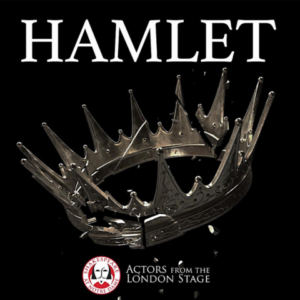 Founded in 1975 at the University of California, Santa Barbara and calling Shakespeare at Notre Dame its home since 2000, Actors From The London Stage celebrates its 50th anniversary in 2025. The company travels to colleges and universities nationwide twice yearly, offering a weeklong residency of workshops and performances. Each member of this self-directed ensemble portrays multiple roles in performance while favoring minimal props and costumes, placing the focus squarely on Shakespeare’s story.
Founded in 1975 at the University of California, Santa Barbara and calling Shakespeare at Notre Dame its home since 2000, Actors From The London Stage celebrates its 50th anniversary in 2025. The company travels to colleges and universities nationwide twice yearly, offering a weeklong residency of workshops and performances. Each member of this self-directed ensemble portrays multiple roles in performance while favoring minimal props and costumes, placing the focus squarely on Shakespeare’s story.
Madness, revenge, and the supernatural: Hamlet remains one of the most well-known of all Shakespeare plays. This powerful tale of vengeance, sanity, and morality continues to resonate with contemporary audiences. Actors From The London Stage celebrates this milestone anniversary with a triumphant return to the Shakespeare Association America’s 2025 Annual Meeting. For more information, visit shakespeare.nd.edu.
10:00 p.m. to 1:00 a.m.
Dance
The Malone Society Dance
📌 Grand Ballroom, Sheraton 2F
This year, the dance is free to all registrants and their guests thanks to the generosity of the Malone Society.
The Malone Society invites all registrants of #Shax2025 to join the dance and join its ranks: malonesociety.com. The Malone Society publishes editions of early printed and manuscript texts of plays, plus collections of documentary material relating to the performance and reception of early drama.
Practicum
Articles in Progress
Louise Geddes, Adelphi University
The practicum supports first time authors preparing their articles for submission to academic journals. Authors will submit an abstract and brief biography and be paired with a senior scholar with editorial expertise who will read a draft of the article and offer feedback at an informal meeting during the conference.
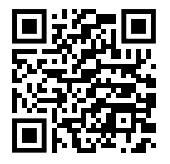 The Malone Society publishes editions of early printed and manuscript texts of plays, plus collections of documentary material relating to the performance and reception of early drama. In addition to the annual volumes distributed to members, we support scholarship through fellowships and research grants, prizes, symposia and a range of bibliographically inspired t-shirts. To join the society, please go to our website: malonesociety.com.
The Malone Society publishes editions of early printed and manuscript texts of plays, plus collections of documentary material relating to the performance and reception of early drama. In addition to the annual volumes distributed to members, we support scholarship through fellowships and research grants, prizes, symposia and a range of bibliographically inspired t-shirts. To join the society, please go to our website: malonesociety.com.
Exhibit Hall is located:
Boston Marriott Copley Place
Gloucester Room, Third Floor
110 Huntington Ave
Boston, MA 02116
Participants of the 53rd Annual Meeting
A
- Ifeoluwa Aboluwade, University of Bayreuth, Germany
- Katherine Acheson, University of Waterloo
- Stella Achilleos, University of Cyprus
- Elizabeth V. Acosta, El Paso Community College
- Brandi K. Adams, Arizona State University
- Mary Adams, Western Carolina University
- Katharine Addis, Sussex University
- Katie Adkison, Bates College
- Patricia Akhimie, Folger Shakespeare Library
- Jahidul Alam, University of Louisiana at Lafayette
- Lucie I. Alden, Georgetown University
- Kat Alix-Gaudreau, Belfast, Maine
- Miranda Alksnis, University of Wisconsin, Madison
- Gemma Kate Allred, Université de Neuchâtel
- Bridget B. Anderson, University of Wisconsin, Madison
- Dane Anderson, University of Michigan
- Susan L. Anderson, Staunton, VA
- Bernadette Andrea, University of California, Santa Barbara
- Jessica Apolloni, Christopher Newport University
- John M. Archer, New York University
- Lukas Arnold, Universität Zürich
- Douglas H. Arrell, University of Winnipeg
- Charlotte Artese, Agnes Scott College
- Abdulhamit Arvas, University of Pennsylvania
- Mira ’Assaf, Butler University
- Amanda B. Atkinson, Texas Christian University
- Katherine B. Attié, Towson University
- Emma K. Atwood, University of Montevallo
- Pavneet S. Aulakh, Vanderbilt University
B
- Rebecca Ann Bach, University of Alabama, Birmingham
- Tamsin T. Badcoe, University of Bristol
- Amanda Bailey, University of Maryland
- David J. Baker, University of North Carolina at Chapel Hill
- Naomi Baker, University of Manchester
- Jonathan Baldo, Eastman School of Music, University of Rochester
- Ariane M. Balizet, Texas Christian University
- Vanessa Rodrigues Barcelos, University of Miami
- Roberta Barker, Dalhousie University
- Lisa M. Barksdale-Shaw, Arizona State University
- Sally Barnden, Swansea University
- Diana G. Barnes, University of New England
- J. K. Barret, University of Texas at Austin
- Bridget Marie Bartlett, University of Mississippi
- Reyut Barzilai, University of Haifa
- Yael Bassan, Trinity College Dublin
- Shaul Bassi, Università Ca’ Foscari Venezia
- Madeline Bassnett, Western University
- Ariel Bates
- Robin Bates, University of Lynchburg
- Sibylle Baumbach, University of Stuttgart
- Mark Bayer, University of Texas, San Antonio
- Meredith Beales, University of British Columbia
- Cordelia Beattie, University of Edinburgh
- Jessica Beckman, Dartmouth College
- Austen Bell, Streetlight Shakespeare Ensemble
- Nicholas Bellinson, St. John’s College, Annapolis
- Frederick Bengtsson, University of Kentucky
- Kristen Abbott Bennett, Framingham State University
- Sean M. Benson, University of Mary Hardin-Baylor
- Lilly Berberyan, Northwestern State University of Louisiana
- James E. Berg, Middlebury College
- Dianne Elizabeth Berg, Clark University
- Jesse Berger, Red Bull Theater
- J.F. Bernard, Montreal, Canada
- Anna Riehl Bertolet, Auburn University
- Thomas Betteridge, Brunel University London
- Caroline Bicks, University of Maine
- Clara K. Biesel, Southern Connecticut State University
- Olivia M. Bievenue, University of California, Santa Barbara
- Roya Biggie, Knox College
- Silvia Bigliazzi, University of Verona
- Valerie Billing, Central College
- Laurel N. Billings, University of Michigan
- Jennifer Birkett, University of Notre Dame
- Amanda Bischoff
- Sarah A. Bischoff, University of California, Los Angeles
- Tom Bishop, University of Auckland
- Andreley Bjelland, University of North Carolina at Chapel Hill
- Jennifer Black, Boise State University
- Theo Black, Cornell University
- Marlin E. Blaine, California State University, Fullerton
- Katherine Blankenau, University of West Florida
- Gina Bloom, University of California, Davis
- Gabriel Bloomfield, United States Naval Academy
- Mary Bly, Fordham University
- Erika M. Boeckeler, Northeastern University
- Christopher William Bolster, University of Connecticut
- Kate Bolton Bonnici, Pepperdine University
- Lucy Ann Boon, Australian National University
- Todd A. Borlik, Purdue University
- Joyce Boro, Université de Montréal
- Ann-Sophie Bosshard, Universität Zürich
- Keith Botelho, Kennesaw State University
- Effie Botonaki, Aristotle University of Thessaloniki, Greece
- Mathieu D.S. Bouchard, John Abbott College
- Katherine Bourlakas, Boston University
- Lara Bovilsky, University of Oregon
- Hannah Elizabeth Bowling, Lincoln University of Missouri
- Andrew Bozio, Skidmore College
- Emma Mattison Bradford, University of North Carolina, Chapel Hill
- Beatrice Bradley, University of Minnesota, Twin Cities
- RaNelle Kathleen Bradley, New York University
- Sarah Bradshaw, University of Delaware
- Anthony Brano, Georgian Court University
- Heidi Brayman, University of California, Riverside
- Hannah Bredar, Anne Arundel Community College
- Michael D. Bristol, McGill University
- Dennis A. Britton, University of British Columbia
- Vladimir Brljak, Durham University
- Benjamin Broadribb, London, England
- Katherine Steele Brokaw, University of California, Merced
- Piers Brown, Kenyon College
- David Sterling Brown, Trinity College
- George H. Brown, Western Carolina University
- Emily D. Bryan, Sacred Heart University
- Stephen M. Buhler, University of Nebraska, Lincoln
- Hanh Bui, Shakespeare’s Globe
- Caitlin Burge, University of Galway
- Diana Burke, University of Massachusetts, Lowell
- Victoria E. Burke, University of Ottawa
- Virginia M. Burnett, Universidad de Puerto Rico
- Margie Burns, University of Maryland, Baltimore County
- Jessica Burr, Blessed Unrest
- Katarzyna Burzyńska, Adam Mickiewicz University
- Rebecca Bushnell, University of Pennsylvania
- Claire M. Busse, La Salle University
C
- Patricia A. Cahill, Emory University
- William Casey Caldwell, Carthage College
- Ryan Campagna, University of Chicago
- Joseph Campana, Rice University
- Catherine G. Canino, University of South Carolina, Upstate
- Leoncarlo Canlas
- Cate Cappelmann, University of Notre Dame
- Erika Lyn Carbonara, Kalamazoo College
- Henry Carges, Rutgers University, New Brunswick
- Kim Howard Carrell, Worcester State University, Massachusetts
- William C. Carroll, Boston University
- Sierra Kay Carter, University of York
- Matthew Charles Carter, Clayton State University
- Sheila T. Cavanagh, Emory University
- Douglas Farquhar Cavers, University of Southern California
- Juan F. Cerdá, Universidad de Murcia
- Urvashi Chakravarty, University of Toronto
- Darryl Chalk, University of Southern Queensland
- Stephanie Chamberlain, Southeast Missouri State University
- Hannah N. Chambers, Emory University
- Rinku Chatterjee, Woodinville, WA
- Zainab Cheema, Florida Gulf Coast University
- Simone Chess, Wayne State University
- Sophie Chiari, Université Clermont Auvergne
- Grayson Chong, University of Massachusetts Amherst
- Ann C. Christensen, University of Houston
- Margaret Christian, Pennsylvania State University, Lehigh Valley
- Rho Chung, Edinburgh, Scotland
- Nicholas Ciavarra, University of Georgia
- Darlena Ciraulo, University of Central Missouri
- Douglas Clark, University of Oxford
- Rachel Ellen Clark, Wartburg College
- Danielle E. Clarke, University College Dublin
- Joanna Clarke, Actors From the London Stage
- Katharine Cleland, Virginia Tech
- Catherine R. Clifford, Hastings College
- Keith Hamilton Cobb
- Dori Coblentz, Georgia Institute of Technology
- Christine Coch, College of the Holy Cross
- Stephen Cohen, Central Connecticut State University
- Emma R. Cohen, Northwestern University
- Ralph Alan Cohen, American Shakespeare Center and Mary Baldwin University
- Esmonde Cole, Actors From the London Stage
- Kimberly Anne Coles, University of Maryland
- Jason Comerford, University of Notre Dame
- Luis J. Conejero-Magro, Universidad de Extremadura
- Sarah Connell, Northeastern University
- Ann Conners, Ashland, OR
- Carolina Conte, Old Dominion University
- Sara Coodin, Washington, D.C.
- Kerry N. Cooke, Mary Baldwin University
- Mackenzie Anne Cooley, Hamilton College
- Kathryn M. Corah, SUNY Albany
- Theodore Corah
- Rocio Corral Garcia, Cornell University
- Jonathan F. Correa Reyes, Clemson University
- Vanessa I. Corredera, Andrews University
- Mayra Cortes, University of California, Los Angeles
- Line Cottegnies, Sorbonne Université
- Sheila Coursey, Saint Louis University
- Emily Coyle, Rutgers University – Newark
- Heidi Craig, University of Toronto
- Mary T. Crane, Boston College
- Julie A. Crawford, Columbia University
- Kathryn A. Crim, University of Chicago Society of Fellows
- Christopher Crosbie, North Carolina State University
- Melissa Croteau, California Baptist University
- Sarah Crover, Vancouver Island University
- Kenneth Crowther, University of Southern Queensland
- Marisa R. Cull, Randolph-Macon College
- Kaitlyn Culliton, Texas A&M International University
- Eli Cumings, Columbia University
- Tracy C. Cummings, San Diego State University
- David Currell, American University of Beirut
D
- Ambereen Dadabhoy, Harvey Mudd College
- Alice Dailey, Villanova University
- Liam Thomas Daley, University of Maryland, College Park
- Deanna M. Danforth, Boston College
- Sabrina D’angelo
- Drew Daniel, Johns Hopkins University
- Grace Danielewicz, Fairfield University
- Nandini Das, University of Oxford
- Deyasini Dasgupta, University of Toronto
- Adele S. Davidson, Kenyon College
- Callan Davies, University of Southampton
- Bethan Mary Davies, University of Roehampton
- Kurt Daw, San Francisco State University
- Brent Dawson, University of Oregon
- Lesel Dawson, University of Bristol
- Eric L. De Barros, American University of Sharjah
- Emma Elizabeth de Beus, Queen’s University Belfast
- Jane Hwang Degenhardt, University of Massachusetts, Amherst
- Angelina Del Balzo, Utah Valley University
- Margaux Delaney, Cornell University
- Laura DeLuca, Carnegie Mellon University
- Stephen Deng, Michigan State University
- Adhaar Noor Desai, Bard College
- Allison K. Deutermann, Baruch College, CUNY
- Nicholas Devlin, The Gallatin School, NYU
- Amanda Di Ponio, Huron University College
- Gina M. Di Salvo, University of Tennessee, Knoxville
- Vernon G. Dickson, Florida International University
- Elizabeth Dieterich, Carnegie Mellon University
- Eli Edmund Dietrich, Boston College
- Natalya Din-Kariuki, University of Warwick
- Lara Dodds, Mississippi State University
- Joel M. Dodson, Southern Connecticut State University
- Nathan Dooner, De Montfort University
- Nathan Keith-Martin Dooner, De Montfort University
- Michelle M. Dowd, University of Alabama
- Maria Doyle, University of West Georgia
- Miles Drawdy, University of California, Berkeley
- Danielle Drees, Harvard University
- Samantha D. Dressel, Chapman University
- Annette Drew-Bear, Washington and Jefferson College
- Pascale Caroline Drouet, Université de Poitiers
- Jennifer Drouin, McGill University
- Cory Drowdowski, Streetlight Shakespeare Ensemble
- Lowell Duckert, University of Delaware
- Meg Duell, University of Lausanne, Lausanne, Switzerland
- Holly E. Dugan, George Washington University
- Delanie R. Harrington Dummit, University of California, Davis
- Leslie C. Dunn, Vassar College
- Susan M. Dunn-Hensley, Wheaton College
- Eric Dunnum, Campbell University
- Allison Duque, University of South Florida
- Patrick Durdel, Université de Lausanne
E
- Claire J. Eager, The College of Wooster
- James Engle, Jr.
- Christopher Earl, New York, NY
- Heather C. Easterling, Gonzaga University
- Fatima F. Ebrahim, Independent Scholar, NJ
- Caroline Egan
- Katherine Eggert, University of Colorado, Boulder
- Hillary Eklund, Grinnell College
- Laurie Ellinghausen, University of Missouri, Kansas City
- Stephanie Elsky, Rhodes College
- Anne Enderwitz, Humboldt-Universität zu Berlin
- Kaitlyn J. Engel, SUNY University at Buffalo
- Lars Engle, University of Tulsa
- Sarah Engle, University of North Carolina, Charlotte
- Natalie K. Eschenbaum, University of Washington, Tacoma
- Doug Eskew, Colorado State University, Pueblo
- Ruben Espinosa, Arizona State University
- Judith B. Esterquest, Red Bull Theater, New York City
- Catherine Rose Evans, University of Exeter
- Kasey Evans, Northwestern University
- Donna Even-Kesef, Stanford University
- Kevin Ewert, University of Pittsburgh, Bradford
F
- Claire M. Falck, Rowan University
- Janet Falon
- Sam Fallon, SUNY Geneseo
- Darlene Farabee, University of South Dakota
- Zachary Farina
- Alan B. Farmer, Ohio State University
- Jean E. Feerick, John Carroll University
- Bridget Fekety, Boston University
- Margaret W. Ferguson, University of California, Davis
- Melody Fetske, Shakespeare Association of America
- Catherine Anne-Marie Field, Purdue University
- Sarah Finigan
- Richard Finkelstein, SUNY-Geneseo
- J. Caitlin Finlayson, University of Michigan, Dearborn
- Kavita Mudan Finn, Manchester, NH
- Susan L. Fischer, Bucknell University
- Kate Flaherty, Australian National University
- Jennifer Flaherty, Georgia College
- Julia Flanders, Northeastern University
- Diego Gregorio Fleitas, University of Mississippi
- Mary Floyd-Wilson, University of North Carolina, Chapel Hill
- Gregory A. Foran, Nazareth University
- Jennifer Forsyth, Kutztown University
- Cora Virginia Fox, Arizona State University
- Megan E. Fox, University of Wisconsin, Madison
- Timothy Francisco, Youngstown State University
- Anne Freeman, University of Mississippi
- Lily Freeman-Jones, Queen Mary University of London
- Sonya Freeman Loftis, Morehouse College
- Becky S. Friedman, University of Pennsylvania
- Michael D. Friedman, University of Scranton
- Susan C. Frye, University of Wyoming
- Barbara Fuchs, University of California, Los Angeles
- Ciara J. Fulton, University at Buffalo, SUNY
- G
- Evelyn Gajowski, University of Nevada, Las Vegas
- Samantha Minerva Gale, Wayne State University
- Nora Galland, University Côte d’Azur
- Joseph Gamble, University of Toledo
- Jonas Gardsby, University of Wisconsin, Green Bay
- Wesley Garey, Charleston Southern University
- Alessandro C. Garganigo, Austin College
- Taimah Garratt, Boston University
- Debra Gasper
- Kim Gauthier, Université du Québec à Montréal
- Louise Geddes, Adelphi University
- Benjamin C. Gee, Stanford University
- Melissa H. Geil, University of North Carolina
- Penelope H. Geng, Macalester College
- William Germano, Cooper Union
- Sambhabi Ghosh, University of Illinois, Urbana-Champaign
- Martin Giannini
- Jonathan Gibson, Open University, UK
- Loreen L. Giese, Ohio University
- Edward Gieskes, University of South Carolina
- Katherine A. Gillen, Texas A&M University, San Antonio
- Matthew Bryan Gillis, University of Tennessee, Knoxville
- Philip Austin Gilreath, Tulane University
- Lisa Gim, Fitchburg State University
- Kelley Katherine Glasgow, Boston College
- Emily Glider, Boston University
- Devon Glover, The Sonnet Man
- Philip Goldfarb Styrt, St. Ambrose University
- David B. Goldstein, York University
- Sandra M. Goldstein Lehnert, Graduate Center, CUNY
- Marinela Golemi, Northern Arizona University
- Abigail Jean Gomulkiewicz, University of St. Francis
- Colby Gordon, Bryn Mawr College
- Cassandra Gorman, Anglia Ruskin University
- Anne F. Gossage, Eastern Kentucky University
- Suzanne Gossett, Loyola University Chicago
- Ani Govjian, University of Pennsylvania
- Kyle Grady, University of California, Irvine
- Anna Graham, University College Dublin
- David J. Gram, Oakland University
- E. Rose Grant, University of Toronto
- Spencer Grayson, University of Virginia
- Douglas E. Green, Augsburg University
- Dalton Greene, University of Maryland, College Park
- Graham K. Gregor, Universidad de Murcia
- Miles P. Grier, Queens College and The Graduate Center, CUNY
- Andrew Griffin, University of California, Santa Barbara
- Aurélie Griffin, Université de la Sorbonne Nouvelle
- Eric J. Griffin, Millsaps College
- Huw Griffiths, The University of Sydney
- Jennifer Elise Grober, King’s College London
- Jane Grogan
- Sarah Grunnah, Weber State University
- Ethan J. Guagliardo, University of British Columbia – Okanagan
- Claire Guéron, Université de Bourgogne
- Musa Gurnis, Baruch College/Red Bull Theater
- Renuka Gusain, University of North Carolina, Asheville
H
- Judith Haber, Tufts University
- Yasmine Hachimi, University of California, Santa Barbara
- Saraya Daisy-May Haddad, Shakespeare Institute, University of Birmingham
- Nicole Hagstrom-Schmidt, Texas A&M University
- Kim F. Hall, Barnard College
- Jess Hamlet, Alvernia University
- Stuart Hampton-Reeves, University of Warwick
- Miranda Hannasch, University of Nevada, Las Vegas
- Claire Hansen, Australian National University
- Elizabeth Hanson, Queen’s University
- Tianhu Hao, Zhejiang University
- Taylor Hare, Baylor University
- Sharon J. Harris, Brigham Young University
- Matthew P. Harrison, West Texas A&M University
- Faith Elizabeth Hart, University of Connecticut, Storrs
- Andrew J. Hartley, University of North Carolina, Charlotte
- David W. Hartwig, Weber State University
- Laura Hatch, Brigham Young University
- Ronan James Hatfull, NYU London / University of Warwick
- Nikolina Hatton, Ludwig-Maximilians-Universität München
- Joseph P. Haughey, Northwest Missouri State University
- Pierre Hecker, Carleton College
- Donald K. Hedrick, Kansas State University
- Judy Margaret Hefferan, University of Southern Queensland
- Anna Hegland, Carthage College
- Christa Hegland
- Joshua R. Held, Southeastern Oklahoma State University
- Nic Helms, Plymouth State University
- Diana E. Henderson, Massachusetts Institute of Technology
- Kaitlin Henderson, University of Florida
- Olivia Henderson, University of California, Santa Barbara
- Margo Hendricks, University of California, Santa Cruz
- Katherine Hennessey, Wenzhou-Kean University
- Seth Philip Herbst, United States Military Academy (West Point)
- Hannah Elizabeth Hicks, University of Notre Dame
- Alani R. Hicks-Bartlett, Brown University
- John C. Higgins, Case Western Reserve University
- Christopher Highley, Ohio State University
- Benjamin Hilb, Francis Marion University
- Alice Marie Benedicte Hinchliffe, University of Guelph
- Mike Hirrel, Arlington, VA
- Heather A. Hirschfeld, University of Tennessee
- Rebecca Hixon, Lourdes University
- Robin Hizme, Queens College, CUNY
- Jessie Hock, Vanderbilt University
- Nathaniel Hodes, Bentley University
- Elizabeth Hodgson, University of British Columbia
- Sarah Hodgson, Shakespeare Institute
- Christine Hoffmann, West Virginia University
- Jason C. Hogue, Texas A&M University-Kingsville
- Marcus Höhne, Evangelisches Schulzentrum Bad Düben
- Timothy Holden, University of Zürich
- Lucy Alice Holehouse, Royal Holloway University of London
- Jennifer R. Holl, Rhode Island College
- Peter Holland, University of Notre Dame
- Marion Doreen Hollings, Middle Tennessee State University
- Gavin Hollis, Hunter College, CUNY
- Eva Johanna Holmberg
- Jonathan H. Holmes, Central State University
- Chloe Holmquist, University of Toronto
- Jonathan R. Hope, Arizona State University
- D. J. Hopkins, San Diego State University
- Eileen A. Horansky, Ohio State University
- Robert Hornback, Oglethorpe University
- Chelsea L. Horne, American University
- Eve Houghton, University of Cambridge
- Jean Elizabeth Howard, Columbia University
- Ashley Howard, University of British Columbia
- Leigh Anne Howard, University of Southern Indiana
- Jifeng Huang, Universität Zürich
- Joanna Huh, University of Cincinnati
- Romana Huk, University of Notre Dame
- Katherine Hunt, University of East Anglia
- Elizabeth B. Hunter, Washington University in St. Louis
- Matthew Hunter, Texas Tech University
- Christine E. Hutchins, Hostos Community College, CUNY
- Kimberly A. Huth, California State University, Dominguez Hills
- Lorna M. Hutson, University of Oxford
- Jareema Hylton, Emory University
- Wendy Beth Hyman, Oberlin College
- Trina Hyun, University at Buffalo, SUNY
I
- William Ingram, University of Michigan
- Andres Irigoyen, University of Chicago
- Bradley J. Irish, Arizona State University
- Islam Issa, Birmingham City University
- Jordan Ivie, Vanderbilt University
- Sujata Iyengar, University of Georgia
J
- Scott Jackson, University of Notre Dame
- Nicole A. Jacobs, California Polytechnic State University
- Miriam E. Jacobson, University of Georgia
- Heather James, University of Southern California
- Yujin Jang, University of Pittsburgh
- Benjamin Jeffery, University of Chicago
- Lisa Jennings, University of Houston, Downtown
- Liesl Elphie Jensen, Shakespeare Institute, University of Birmingham
- Phebe Jensen, Utah State University
- Janelle Auriol Jenstad, University of Victoria
- Eric M. Johnson, George Mason University
- Laurie Johnson, University of Southern Queensland
- Melissa M. Johnson, Lyon College
- Sarah E. Johnson, Royal Military College of Canada
- Toria Anne Johnson, University of Birmingham
- Emily G. Jones, University of South Florida
- Keith Jones, University of Northwestern, Saint Paul
- Lindsey L. Jones, Texas A&M University
- Melissa J. Jones, Eastern Michigan University
- Nicholas Jones, Oberlin College
- Lenora Bellee Jones-Pierce, Centenary College of Louisiana
- Alexa Alice Joubin, George Washington University
K
- Yunah Kae, College of Charleston
- Mark Beatrice Kaethler, Medicine Hat College
- Coppélia H. Kahn, Brown University
- Owen Kane, Brock University
- M. Lindsay Kaplan, Georgetown University
- Ruth Kaplan, Quinnipiac University
- Farah Karim-Cooper, Folger Shakespeare Library
- Isabel C. Karremann, Universität Zürich
- Jim Kearney, University of California, Santa Barbara
- Nathan Powell Keckley, Syracuse University
- Sean Keilen, University of California, Santa Cruz
- Shannon E. Kelley, Fairfield University
- Robin Alfriend Kello, Seton Hall University
- Bernadette Kelly, Wayne State University
- Erin E. Kelly, University of Victoria
- Erin K. Kelly, California State University, Chico
- Sawyer K. Kemp, Queens College, CUNY
- Gillian Murray Kendall, Smith College
- Bill Kerwin, University of Missouri
- Amir Khan, Hunan Normal University
- Joseph Hirzer Kidney, Stanford University
- Margaret Jane Kidnie, University of Western Ontario
- Grace Kimball, University of California, Santa Barbara
- Clare R. Kinney, University of Virginia
- Peter Kirwan, Mary Baldwin University
- Aaron Kitch, Bowdoin College
- Chris Klippenstein, Sarah Lawrence College
- Abby Klug, University of Massachusetts, Amherst
- James A. Knapp, Loyola University Chicago
- Travis Knapp, Valley City State University
- Leah Knight, Brock University
- Gillian Knoll, Western Kentucky University
- Katherine I. Knowles, The University of Kansas
- Yu Jin Ko, Wellesley College
- Jonathan Koch, Pepperdine University
- Laura E. Kolb, Baruch College, CUNY
- Margo Kolenda-Mason, University of Central Arkansas
- Elizabeth Zeman Kolkovich, Ohio State University
- Samuel Kolodezh, University of California, San Diego
- Natasha Korda, Wesleyan University
- Hannah Korell, University of Wisconsin, Platteville
- Sylvia Chi-hua Korman, Graduate Center, CUNY
- Ira J. Kortum, Portland, OR
- Marcela Kostihova, Hamline University
- Radhika Koul, Claremont McKenna College
- Anna Kowalcze-Pawlik, University of Lodz
- Matthew Kozusko, Ursinus College
- Jennifer Dawson Kraemer, Texas Christian University
- John M. Kuhn, SUNY Binghamton
- Peter Kuling, University of Guelph
- Sarah S. Kunjummen, University of Chicago
- James Kuzner, Brown University
L
- Kyle Matthew Labe, University of Connecticut
- Alexandra Elise LaGrand, Texas A&M University
- Edel Lamb, Queen’s University Belfast
- Jonathan P. Lamb, University of Kansas
- Josiah Lamb, University of Toronto
- Jesse M. Lander, University of Notre Dame
- Katharine E. Landers, Illinois State University
- David Landreth, University of California, Berkeley
- Douglas M. Lanier, University of New Hampshire
- Chris Laoutaris, Shakespeare Institute, University of Birmingham
- Francois Laroque, Sorbonne Paris
- Heather Larson
- Alexander Paulsson Lash, National Taiwan University
- Sean K. Lawrence, University of British Columbia, Okanagan
- Elizabeth Frances Lazzari, University of Washington
- Chelsea Lee, University of California, Irvine
- Tonhi Lee, Tufts University
- Kelly Lehtonen, Campbellsville University
- Bi-qi Beatrice Lei, Shakespeare Association of America
- Jasmine S. Lellock, Newton South High School
- Sophie Lemercier-Goddard, ENS, Université de Lyon
- Allison Lemley, Johann Wolfgang Goethe-Universität Frankfurt am Main
- Rebecca Lemon, University of Southern California
- Victor Lenthe, Bilkent University
- Nathaniel C. Leonard, Westminster College, Missouri
- Olivia Leonard, Arizona State University
- Sarah Gray Lesley, University of Chicago
- Zachary Lesser, University of Pennsylvania
- Anouska Lester, University of York
- Laura E. Levine, New York University
- Nina Levine, University of South Carolina
- Jennifer Lewin, University of Haifa
- Anna Rebecca Lewis, University of Toronto
- Alex Lewis, Folger Shakespeare Library
- Oliver Lewis, University of Roehampton
- Patrick Lewis
- Summer Lewis, Jacksonville University/Suffolk Law
- Anna Lewton-Brain, Dawson College
- Naomi C. Liebler, Montclair State University
- Amani Liggett, University of California, Santa Cruz
- Erika T. Lin, Graduate Center, CUNY
- Willnide Lindor, SUNY Cortland
- Caroline Lion, The New Swan Theater, University of California, Irvine
- Arthur L. Little, Jr., University of California, Los Angeles
- Jennifer Lillian Lodine-Chaffey, Montana State University, Billings
- Emily L. Loney, Bucknell University
- Patrick J. Long, University at Buffalo, SUNY
- Allen M. Loomis, Binghamton University
- Natalie J. Loper, University of Alabama
- Jeremy Lopez, Montclair State University
- Philip Lorenz, Cornell University
- Genevieve Love, Colorado College
- Tess Lovell, Cornell University
- Jennifer A. Low, Florida Atlantic University
- Scott C. Lucas, The Citadel
- Kristina Lucenko, Stony Brook University
- Christina Luckyj, Dalhousie University
- Alexandra Maya Lukawski, Western University
- Julia Reinhard Lupton, University of California, Irvine
- Ross Luther
- Sara D. Luttfring, Pennsylvania State University, Behrend
- Kathleen Lynch, Folger Shakespeare Library
- Tara L. Lyons, Illinois State University
M
- Joyce G. MacDonald, University of Kentucky
- Ian F. MacInnes, Albion College
- Emily MacLeod, Penn State Harrisburg
- Rebecca Marie MacMillan, Stroud, UK
- Ali Madani, Stanford University
- Joseph Maddocks, Sheffield Hallam University
- Céline Laure Magada, Université de Lausanne
- Lynne Magnusson, University of Toronto
- Caitlin Mahaffy, Mount Holyoke College
- Scott Maisano, University of Massachusetts Boston
- Jenny C. Mann, New York University
- Mitchell Manners, AM Digital
- James D. Mardock, University of Nevada, Reno
- James J. Marino, Cleveland State University
- Zoltán Márkus, Vassar College
- Karen S. Marsalek, St. Olaf College
- Randall Martin, University of New Brunswick
- Maya Mathur, University of Mary Washington
- Sasha Harmon Matthews, Pomona College
- Andrew Mattison, University of Toledo
- Christopher Matusiak, Ithaca College
- Ágnes Matuska, Szegedi Tudományegyetem
- Margaret C. Maurer, Dartmouth College
- Katharine Eisaman Maus, University of Virginia
- Ashley-Marie Maxwell, Université de Montréal
- Lynn M. Maxwell, Spelman College
- Kris L. May, Texas A&M University
- Cary M. Mazer, University of Pennsylvania
- Carla Mazzio, University of California, Riverside
- Kris McAbee, University of Arkansas, Little Rock
- Kara McCabe, Emerson College
- Jess McCall, Delaware Valley University
- David F. McCandless, Southern Oregon University
- Andrew D. McCarthy, University of Tennessee, Chattanooga
- Erin A. McCarthy, University of Galway
- Jeanne H. McCarthy, Georgia Gwinnett College
- Lynsey McCulloch, Royal Shakespeare Company
- Tricia McElroy, University of Alabama
- Thomas McGrath
- Emer McHugh, Queen’s University Belfast
- David McInnis, University of Melbourne
- Linda McJannet, Bentley University
- Kelly McKisson, Rice University
- Victoria Louise McMahon
- Clare McManus, Northumbria University
- Gordon McMullan, King’s College London
- Cameron H. McNabb, Eckerd College
- Kate McPherson, Utah Valley University
- Paula McQuade, DePaul University
- Carol Mejia LaPerle, Wright State University
- Barbara Mello, California State University, Long Beach
- Avi Mendelson, London, UK
- Maria Sequeira Mendes, Universidade de Lisboa
- Vincent Mennella, Southern Methodist University
- Steve Mentz, St. John’s University
- Paul D. Menzer, Mary Baldwin University
- Josh Mercer, Pomona College
- Katie Mestres, Streetlight Shakespeare Ensemble
- Dustin M. Meyer, Francis Marion University
- Alexander Thomas Mika, Pennsylvania State University
- Anne-Marie Miller-Blaise, Université Sorbonne Nouvelle
- Tracey Miller-Tomlinson, New Mexico State University
- Erin K. Minear, College of William & Mary
- Gretchen E. Minton, Montana State University
- Rohan Misra, Boston University
- Dianne Mitchell, University of Colorado, Boulder
- Nona Monahin, Mount Holyoke College
- Kathryn M. Moncrief, Worcester Polytechnic Institute
- Jesus A. Montaño, Baylor University
- Steven Monte, College of Staten Island, CUNY
- Marianne Montgomery, East Carolina University
- Thomas J. Moretti, Iona University
- Angeline M. Morris, University of Tennessee Southern
- Sara Morrison, William Jewell College
- Tanya Schmidt Morstein, Stanford
- Daniel D. Moss, Southern Methodist University
- Ian F. Moulton, Arizona State University
- John M. Mucciolo, Sayville, NY
- Adeline Mueller, Mount Holyoke College
- Subha Mukherji, University of Cambridge
- James Yukiko Mulder, Bentley University
- Cyrus Mulready, SUNY New Paltz
- Monica Lyn Multer, University of California, Santa Cruz
- Victoria M. Muñoz, Adelphi University
- Lucy Munro, King’s College London
- Andrew D. Murphy, University of Saint Andrews
- Jessica C. Murphy, Montclair State University
- Matt Murphy, Ursuline Academy
- Grace Elizabeth Murray, Birkbeck, University of London
- Heather Murray, UNG/eCore
- Bernadette Myers, Washington University in St. Louis
- Anne M. Myers, University of Missouri
- Nova Myhill, New College of Florida
N
- Prajna Nair, Massachusetts Institute of Technology
- Vin Nardizzi, University of British Columbia
- Courtney Naum Scuro, Columbus, OH
- Noémie Ndiaye, University of Chicago
- Jane Marilyn Nead, University of Birmingham
- David Nee, Louisiana State University
- Kate Needham, University of Mississippi
- Alan H. Nelson, University of California, Berkeley
- Dylan Nelson
- Sarah Neville, Ohio State University
- Lori Humphrey Newcomb, University of Illinois, Urbana-Champaign
- James T. Newlin, Case Western Reserve University
- Leah Newsom, Arizona State University
- Emily Rose Nicholls, King’s College London / University of Hong Kong
- Catherine Nicholson, Yale University
- Jennifer E. Nicholson, University of Sydney
- David Nicol, Dalhousie University
- Marissa Nicosia, Pennsylvania State University, Abington College
- Shuo Niu, University of York
- Kara J. Northway, Kansas State University
- Shaun Nowicki, University of California, Santa Barbara
- Hillary M. Nunn, University of Akron
O
- Barry Odbert
- Mary Odbert, Fort Collins, Colorado
- Elisa Oh, Howard University
- Alyse Kay O’Hara Sweeney, University of Connecticut
- Katie Elizabeth O’Hare, University of California, Santa Cruz
- Scott Oldenburg, Tulane University
- Niamh J. O’Leary, Xavier University Times New Roman
- Abigail Olshin, Streetlight Shakespeare Ensemble
- Kristen L. Olson, Pennsylvania State University
- Rebecca Olson, Oregon State University
- Dana Omirova, Rutgers University, New Brunswick
- Patricia O’Neil
- Sim Ong, University of Toronto
- Mike Opal, Muhlenberg College
- Lena Cowen Orlin, Georgetown University
- Robert Ormsby, Memorial University of Newfoundland
- James N. Ortego II, Troy University, Dothan campus
- Joseph M. Ortiz, University of Texas, El Paso
- Q. Ostendorf, Occidental College
- Conor O’Sullivan, Western Reserve Academy Chloe Otterson, Millerton, NY
- Howard Owens
- Margaret E. Owens, Nipissing University
P
- Johann Paccou, Université Sorbonne Nouvelle
- Emily Parise, University of California, Irvine
- Courtney A. Parker, Huntingdon College
- John L. Parker, University of Virginia
- Megan Parlett, Streetlight Shakespeare Ensemble
- Peter A. Parolin, University of Wyoming
- Benjamin Parris, Rice University
- Meg Pash, Mount Holyoke College
- Kevin Pask, Concordia University
- Vimala C. Pasupathi, Hofstra University
- Anthony G. Patricia, Concord University
- Jayme Peacock, Quincy University
- Elena Pellone, Melbourne, Australia
- Joseph Penczak, Troupe of Friends
- Nathan Pensky, Duquesne University
- Sadie Pepperrell, Actors From the London Stage
- George N. Perez, Penn State
- José A. Pérez Díez, University of Leeds
- Arnie Perlstein, Portland, OR
- Curtis Perry, University of Illinois, Urbana-Champaign
- Giulio Pertile, University of St Andrews
- Kaara Peterson, Miami University of Ohio
- Chelsea Phillips, Villanova University
- Holly C. Pickett, Washington and Lee University
- Goutam Piduri, Brown University
- Chad Piersma
- Emily L. Piersma Sharrett, Loyola University Chicago
- Tripthi Pillai, Coastal Carolina University
- Caro Pirri, University of Pittsburgh
- Kate Pitt, New York, NY
- L. Monique Pittman, Andrews University
- Kyle A. Pivetti, Norwich University
- Tanya Pollard, Brooklyn College, CUNY
- Kristen K. Polster, Southern Methodist University
- Matt Polster
- Kristen E. Poole, University of Delaware
- Mickael Boris Popelard, University of Caen Normandy, France
- Charlotte Potter, Université de Genève
- Rachel E. Poulsen, Edgewood College
- Ellie Powell, Harvard College
- Chloe K. Preedy, University of Exeter
- Richard Preiss, University of Utah
- Maria Teresa Micaela Prendergast, College of Wooster
- Eoin Price, University of Edinburgh
- Julie Bernadette Prior, Dallas College
- John F. Proctor, Tulane University
- Ray Proctor, Tulane University
- Laurence J. Publicover, University of Bristol
- Melissa Pullara, Mount Royal University
- James Purkis, University of Western Ontario
- Jan K. Purnis, Campion College, University of Regina
- Valerie Clayman Pye, Long Island University
Q
- Kevin A. Quarmby, College of St. Scholastica
- Gerit Quealy, New York, NY
- Molly Quinn-Leitch, Queen’s University Belfast
- Rebecca M. Quoss-Moore, University of Central Oklahoma
R
- Karen Raber, University of Mississippi
- Cristiano Ragni, University of Verona
- Ayesha Ramachandran, Yale University
- Shankar Raman, Massachusetts Institute of Technology
- William R. Rampone, Jr., South Carolina State University
- James Ramsay
- Anandi Rao, SOAS, University of London
- Namratha Rao
- Vanessa L. Rapatz, Ball State University
- Eric Rasmussen, University of Nevada
- Anita Raychawdhuri, University of Houston, Downtown
- Benjamin Sidney Reed, University of Nebraska, Lincoln
- Catherine Reedy, Lake Forest College
- Anne Sophie Refskou, Aarhus University, Denmark
- Evelyn A. Reidy, University of Roehampton and Shakespeare’s Globe
- Kimberly G. Reigle, Mars Hill University
- Andrew Reilly, Université de Genève
- Constance C. Relihan, Virginia Commonwealth University
- Peter C. Remien, Lewis-Clark State College
- Camila Reyes, University of Southern California
- Johaeng Rho, Saint Louis University
- De’Aris Rhymes, Arizona State University
- James Richard, Actors From the London Stage
- Jonah Kent Richards, Lawrence Academy
- Sophia Richardson, Massachusetts Institute of Technology
- Kelsey Ridge, Alvernia University
- Melanie Rio, Philadelphia, PA
- Matthew Ritger, Dartmouth College
- Nathalie E. Rivere De Carles, Université de Toulouse Jean Jaures
- Elizabeth J. Rivlin, Clemson University
- James A. Rizzi, Canisius University
- Karen Robertson, Vassar College
- Lauren Robertson, Columbia University
- Benedict S. Robinson, Stony Brook University
- Marie H. Roche, University of Massachusetts, Amherst
- Katey E. Roden, Gonzaga University
- Don Rodrigues, Old Dominion University
- Susan Rojas, Naples, FL
- Kirsty Rolfe
- Emily Rome, Boston, MA
- Jacob Romm, Yale University
- Jessica Rosenberg, Cornell University
- Colleen R. Rosenfeld, Pomona College
- Danielle Rosvally, University at Buffalo, SUNY
- Amos Rothschild, St. Thomas Aquinas College
- William G. Roudabush, Southern Methodist University
- Nikki Roulo, University of Michigan
- Lindsey Row-Heyveld, Luther College
- J. Asia Rowe, St. Joseph’s College of Maine
- Suparna Roychoudhury, Mount Holyoke College
- Jennifer Ruiz-Morgan, Universidad de Murcia
- Kara Ann Rush, University of North Carolina, Chapel Hill
- Tom Russell
- Jennifer R. Rust, Saint Louis University
- Amanda K. Ruud, Valparaiso University
- Eleanor K. Rycroft, Bristol University
- Bradley D. Ryner, Arizona State University
- Adam Rzepka, Montclair State University
S
- Michael B. Saenger, Southwestern University
- Madeleine Saidenberg, Oxford University
- Carolyn Sale, University of Alberta
- Melissa E. Sanchez, University of Pennsylvania
- Niyanta Sangal, University of Maryland College Park
- Adrianna M. Santos, Texas A&M University, San Antonio
- Kathryn Vomero Santos, Trinity University
- Debapriya Sarkar, University of Connecticut
- Ashley Sarpong, California State University, Stanislaus
- Tyler Sasser, University of Alabama
- Alison Victoria Scarlett, University of South Florida
- Ellen Schaffert, University of Nottingham
- David J. Schalkwyk, Queen Mary University of London
- Kiki Lois Gene Schlosberg
- Lucas Schiavinato
- Phillip Schlosberg, Independent Scholar
- Gregory M. Schnitzspahn, Fisher College
- Josie Schoel, Endicott College
- Emily Schoenbeck, University of Minnesota
- Kurt A. Schreyer, University of Missouri, Saint Louis
- Kathryn Schubert, University of California, Irvine
- Kirsten Schuhmacher, University of California, Davis
- Esther B. Schupak, Bar-Ilan University
- Kathryn Schwarz, Vanderbilt University
- Amy J. Scott, Toronto, ON
- Connie Scozzaro, Brown University
- Tracey Sedinger, University of Northern Colorado
- Megan Lynn Selinger, University of Waterloo
- Nancy Selleck, University of Massachusetts Lowell
- Aidan Selmer, Rutgers University
- Gregory M. Semenza, University of Connecticut, Storrs
- Edel Semple, University College Cork
- Ira Sen, University of Mississippi
- Alexandra Kathryn Sengupta, George Washington University
- Molly E. Seremet, Mary Baldwin University
- Anna-Rose Katerina Shack, University of Amsterdam
- Sydney Shamblin Anderson, University of Miami
- Laurie Shannon, Northwestern University
- Emily L. Sharrett, Loyola University Chicago
- Morgan Taylor Shaw, Syracuse University
- Justin P. Shaw, Clark University
- Jonathan Shelley, St. John Fisher University
- Nicole Sheriko, Yale University
- Anita G. Sherman, American University
- Davis Sherman
- Stephanie Shirilan, Syracuse University
- Maria Shmygol, Oxford Centre for Islamic Studies
- Lauren Shohet, Villanova University
- Emily Shortslef, University of Kentucky
- Katherine I. Shrieves, University of Massachusetts, Lowell
- Michael W. Shurgot, South Puget Sound Community College
- James R. Siemon, Boston University
- Andie Silva, York College, CUNY
- Melanie Simoes Santos, University of New Brunswick
- Isaac Simon, Emerson College
- Tina Simpson, New York, NY
- Sarah Sinclair
- Bailey Sincox, Princeton University
- Jerome E. Singerman, Philadelphia, PA
- Jyotsna G. Singh, Michigan State University
- Joel E. Slotkin, Towson University
- Monika Smialkowska, Northumbria University
- Amy L. Smith, Kalamazoo College
- Cristiane Busato Smith, Arizona State University
- Emma Smith, Hertford College, University of Oxford
- Ian Smith, University of Southern California
- Khristian S. Smith, University of North Carolina, Chapel Hill
- Simon Smith, Shakespeare Institute, University of Birmingham
- Wendy Smith, Brooklyn, NY
- Eilis Smyth, Trinity College Dublin
- Megan Snell, Boston University
- Edith L. Snook, University of New Brunswick
- Jillian Snyder, University of Notre Dame
- Andrew Sofer, Boston College
- Natasha Sofranac, Belgrade University
- Emma M. Solberg, Bowdoin College
- Deborah Solomon, Auburn University
- Claire Sommers, Washington University in St. Louis
- Julia Sommer, Streetlight Shakespeare Ensemble
- Grant Sorenson, Boston University
- Patrick Soto, Yale University
- Laina Southgate, University of Toronto
- Christi Spain-Savage, Siena College
- Brooke Spang, Pennsylvania State University, Abington College
- Rachel Leann Spencer, University of Texas at Austin
- Whitney Sperrazza, Texas A&M University
- Stephen Spiess, Babson College
- John-Paul Spiro, Villanova University
- Madelon Marie Sprengnether, University of Minnesota
- Jeffrey Scott Squires, Carnegie Mellon University in Qatar
- Danielle A. St. Hilaire, Duquesne University
- Kelly J. Stage, University of Nebraska, Lincoln
- Robert Stagg, Texas A&M University
- Sara Stamatiades, Cornell University
- Jade Standing, Queen’s University
- Goran Stanivukovic, Saint Mary’s University
- Kay Stanton, California State University, Fullerton
- M. L. Stapleton, Purdue University, Fort Wayne
- Lisa S. Starks, University of South Florida
- Dustin Stegner, Cal Poly, San Luis Obispo
- Mary K. Steible, Southern Illinois University Edwardsville
- Emanuel Stelzer, University of Verona
- Joseph F. Stephenson, Abilene Christian University
- Alan Stewart, Columbia University
- Jitka Štollová, Helsinki Collegium for Advanced Studies
- Richard Allen Strier, University of Chicago
- Erin Sullivan, Shakespeare Institute, University of Birmingham
- Garrett A. Sullivan, Pennsylvania State University
- David A. Summers, Capital University
- Arya Sureshbabu, University of California, Berkeley
- Natalie Suzelis, Antioch College
- Mihoko Suzuki, University of Miami
- Steven Swarbrick, Baruch College, CUNY
- Alyse Kay Sweeney, University of Connecticut
T
- Dyani J. Taff, Colby College
- Amina Tajbhai, Hostos Community College, CUNY
- Liv Tambascio
- Suzanne Tanner, Avila University
- Brayden Tate, University of Alberta
- Elizabeth E. Tavares, University of Alabama
- Barbara Taylor, Australian National University
- Alex Teicheira, e-Cornell & Florida Studio Theater
- Misha Teramura, University of Toronto
- Jeff Theis, Salem State University
- Alexander Thom, University of Leeds
- Ashley Thomas, Columbia University
- Catherine E. Thomas, Georgia Institute of Technology
- Julie Thompson, Burman University
- Mayahuel Thompson, Boston University
- Erica Thrower
- Charlotte Thurston, Graduate Center, CUNY
- Austin Tichenor, Chicago, IL
- Amy L. Tigner, University of Texas, Arlington
- John J. Tobin, University of Massachusetts, Boston
- Susannah Barton Tobin
- Dorothy Todd, Texas A&M University
- Alicia Tomasian, William Rainey Harper College
- Mackenzie Margaret Tomlinson, Oklahoma State University
- Jessica Tooker, Indiana University, Bloomington
- Katayoun Torabi, Texas A&M University
- Will Tosh, Shakespeare’s Globe
- Rebecca Totaro, Florida Gulf Coast University
- Jeanette N. Tran, Drake University
- Sally Treanor, myShakespeare
- Ted Tregear, University of Oxford
- Evelyn Tribble, University of Connecticut
- Suzanne Trill, University of Edinburgh
- Marie Trotter, McGill University
- Scott A. Trudell, University of Maryland
- Mary H. Truglia, Indiana University
- Mariana Trujillo Marquez, CUNY Graduate Center
- Mary Trull, St. Olaf College
- Naya Tsentourou, University of Exeter
- Olga Tsygankova, McGill University
- Laura Turchi, Arizona State University
- Henry S. Turner, Rutgers University
U
- Michael Ullyot, University of Calgary
- Deborah Uman, Weber State University
- Steven Urkowitz, City College of New York, CUNY
- Penelope Meyers Usher, Barnard College
- Nicholas Utzig, U.S. Military Academy, West Point
V
- Liz Vance, Arlington, VA
- Benjamin VanWagoner, New York, NY
- Cristine M. Varholy, Hampden-Sydney College
- Christine Varnado, University at Buffalo, SUNY
- David Vaughan, Northwestern Oklahoma State University
- Virginia Mason Vaughan, Clark University
- Jennifer C. Vaught, University of Louisiana, Lafayette
- Amanda Vialva
- José Juan Villagrana, Santa Clara University
- Gabriela Villanueva, Universidad Nacional Autónoma de México
- Irene Madeleine Vilquin, Université Sorbonne Nouvelle Paris III
- Megan Vinson, Indiana University
- Maggie Vinter, Case Western Reserve University
- Mel Vipperman-Cohen, California State University, Fullerton
- Daniel J. Vitkus, University of California, San Diego
- Eric D. Vivier, Mississippi State University
- Valerie Voight, University of Tennessee
- Jennie M. Votava, Allegheny College
W
- Michael Wagg, Actors From the London Stage
- Michael M. Wagoner, United States Naval Academy
- Christina Wald, Universität Konstanz
- Jennifer Waldron, University of Pittsburgh
- Denise A. Walen, Vassar College
- Jessica Walker, University of North Georgia
- Katherine Nicole Walker, University of Nevada, Las Vegas
- Wendy Wall, Northwestern University
- Sarah Wall-Randell, Wellesley College
- Simone Waller, Reed College
- Matthew Walsh, University of Massachusetts, Amherst
- Gina Walter, University of Bristol
- Melissa E. Walter, University of Fraser Valley
- Josephine Wang, Princeton University
- Thomas Ward, United States Naval Academy
- Cora Wareh
- Patricia Wareh, Union College
- Christopher Warren, Carnegie Mellon University
- Jack Warren
- Greg Watkins, Stanford University
- Robert N. Watson, University of California, Los Angeles
- Breanne Weber, James Madison University
- Erin Webster, William & Mary
- Ana Weinberg, Universidad Nacional Autónoma de México
- Lauren Weindling, University of Toronto (CRRS)
- Emily Weissbourd, Lehigh University
- Daryl Wells
- Paul Werstine, King’s University College, University of Western Ontario
- Tiffany J. Werth, University of California, Davis
- Caitlin Mary West, University of Queensland
- Michael West, University of Dallas
- William N. West, Northwestern University
- Paul Whitefield White, Purdue University
- H. Austin Whitver, University of Alabama
- Anne-Maree Ruth Wicks, University of Southern Queensland
- Lina P. Wilder, Connecticut College
- Tom Wilkinson, Oxford, UK
- Brittany N. Williams, Boston, MA
- Dawn Monique Williams, University Southern California, Rossier School of Education
- Deanne Williams, York University
- Katherine Schaap Williams, University of Toronto
- Nora J. Williams, BIMM University
- Travis D. Williams, University of Rhode Island
- Laura Williamson, Saint Mary’s College
- Rachel J. Willie, Liverpool John Moores University
- Deborah Willis, University of California, Riverside
- Georgina Eleanor Mary Wilson, University of York
- Hannah Louise Wilson, King’s College London
- Jordan Windholz, Shippensburg University
- Linda Ruth Winer, Fairfax Schools Fairfax, Virginia substitute
- Emily F. Winerock, Shakespeare and Dance Project / Point Park University
- Jennifer Winter
- Stephen M. Wisker, Wesleyan College
- Stephen Wittek, Carnegie Mellon University
- Susanne L. Wofford, New York University
- Lisa Nicole Wolpe, Santa Monica, CA USA
- Gillian Woods, Oxford University
- W. B. Worthen, Barnard College, Columbia University
- Ramona Wray, Queen’s University Belfast
- Marion Wynne-Davies, University of Surrey
X
- Savannah Rae Xaver, Western Michigan University
Y
- Daniel Yabut, CNRS/Université de Montpellier Paul-Valéry
- Paul Yachnin, McGill University
- Andrea Yang, University of California, Davis
- Sharon R. Yang, Worcester State University
- John Yargo, Boston College
- Emily Yates, Clemson University
- Julian Yates, University of Delaware
- John Yavroyan
- Jon Yavroyan
- Jayme M. Yeo, Belmont University
- Victoria Yeoman, Seneca Polytechnic
- Eunwoo Yoo, University of California, Santa Barbara
- Belinda Yung, Massachusetts Institute of Technology
Z
- Jordan Zajac, Providence College
- Paul J. Zajac, McDaniel College
- Eliza Zangerl, Harvard College
- Natalia S. Zelezinskaya, Belarusian State University
- Corinne Zeman, Texas A&M University, Corpus Christi
- Rui Zhu
- Molly Ziegler, The Open University
- Mary Erica Zimmer, Massachusetts Institute of Technology
- Aaron Zook
- Adam Zucker, University of Massachusetts, Amherst
- Jay Zysk, University of Massachusetts, Dartmouth


